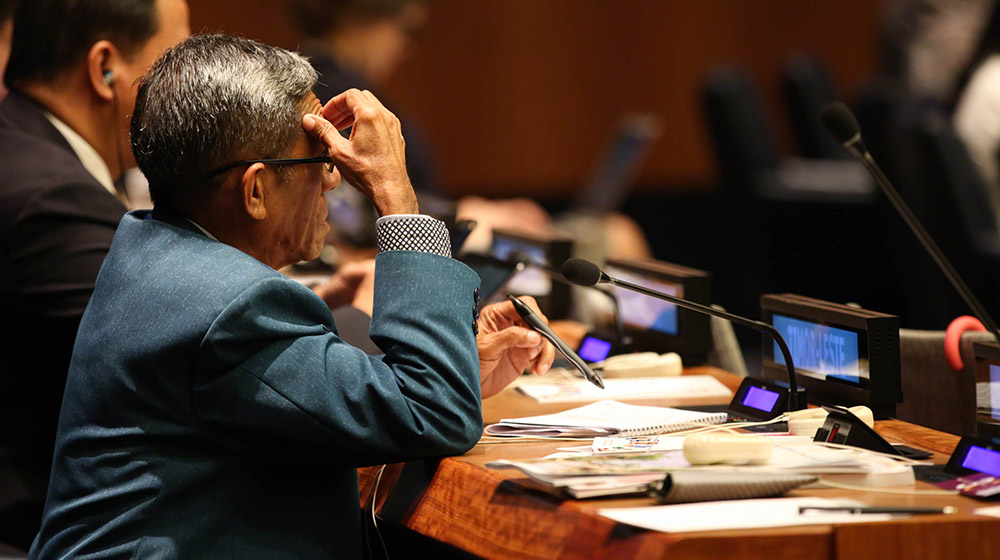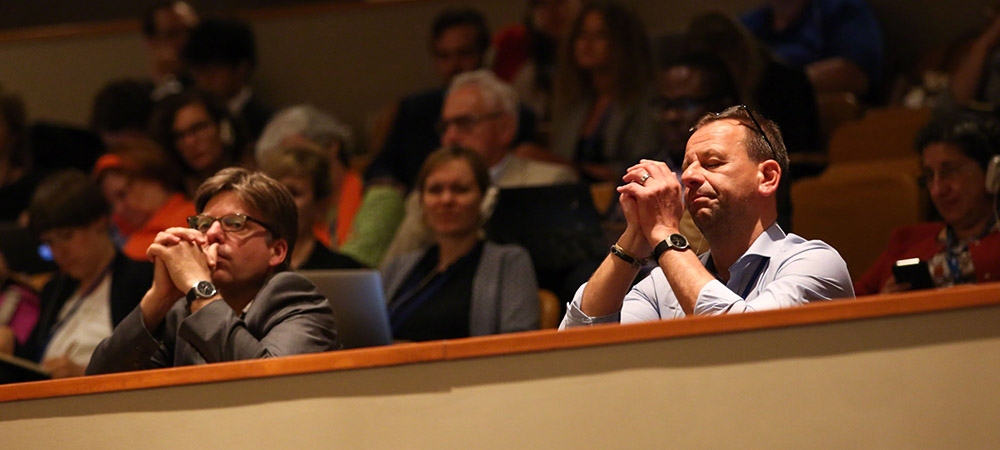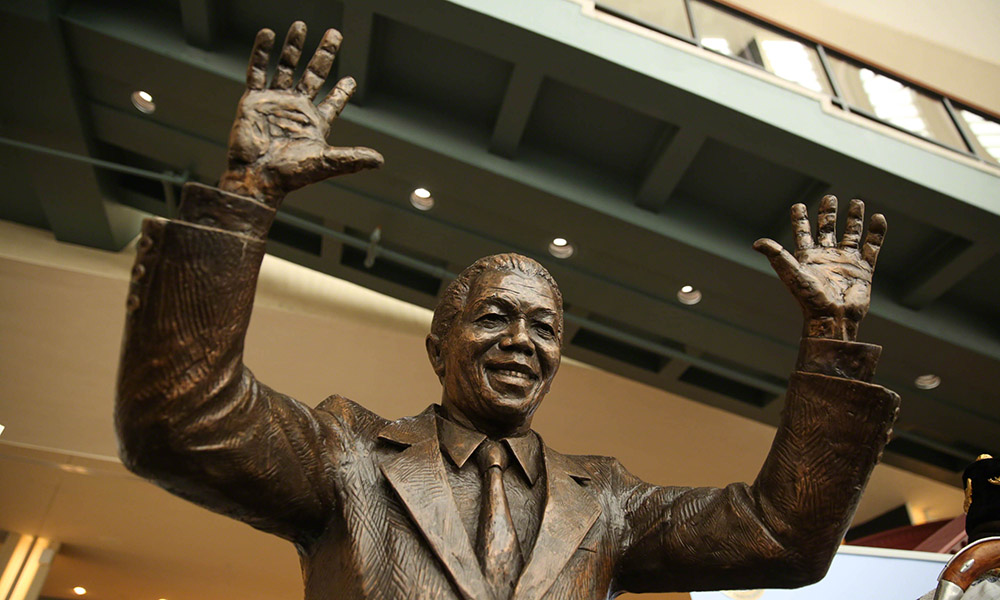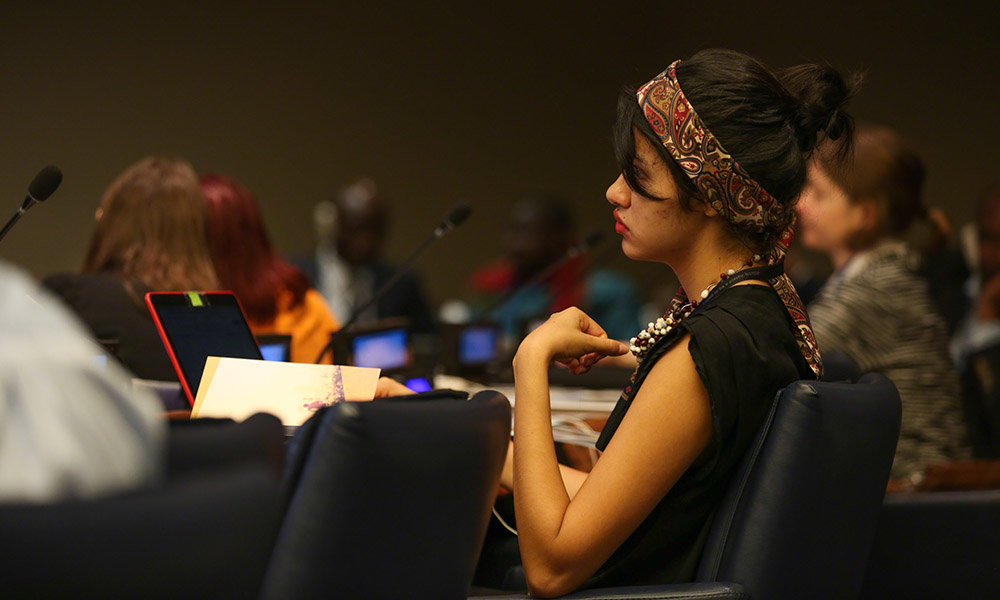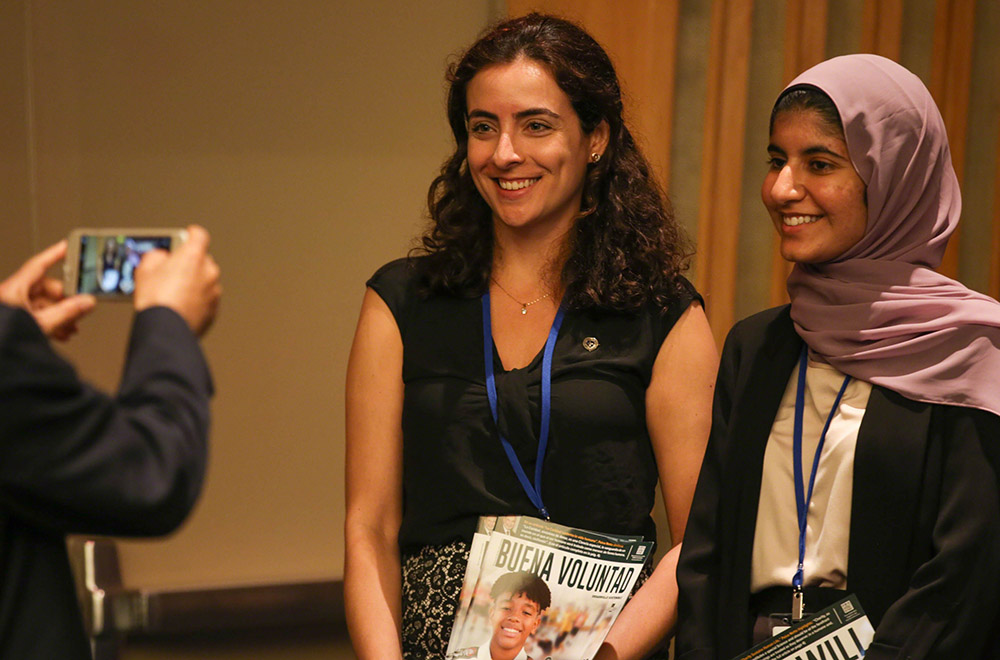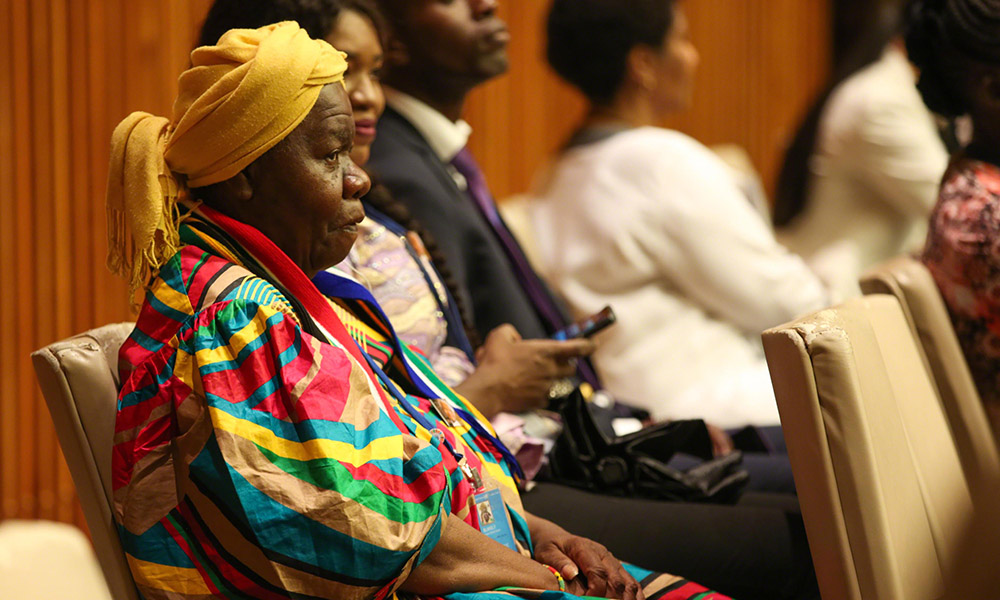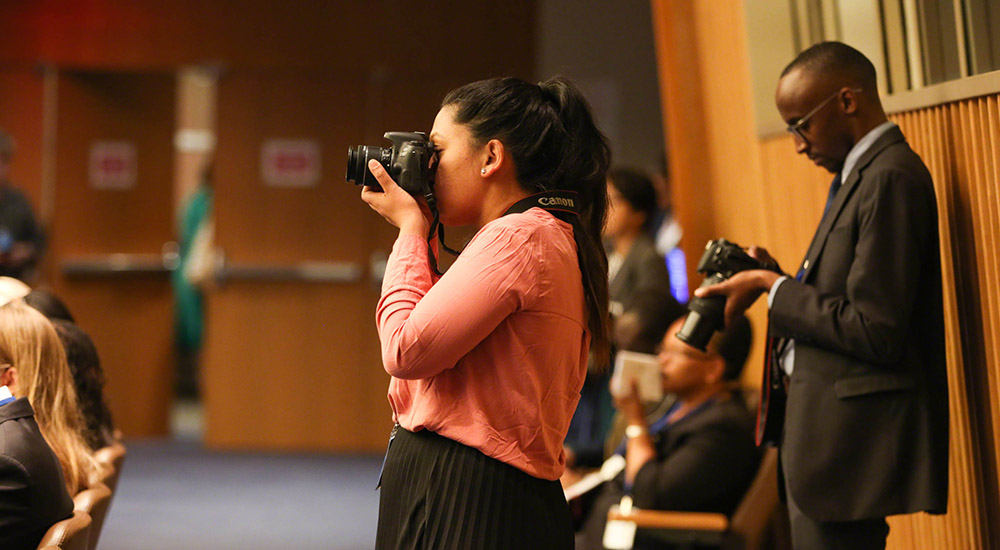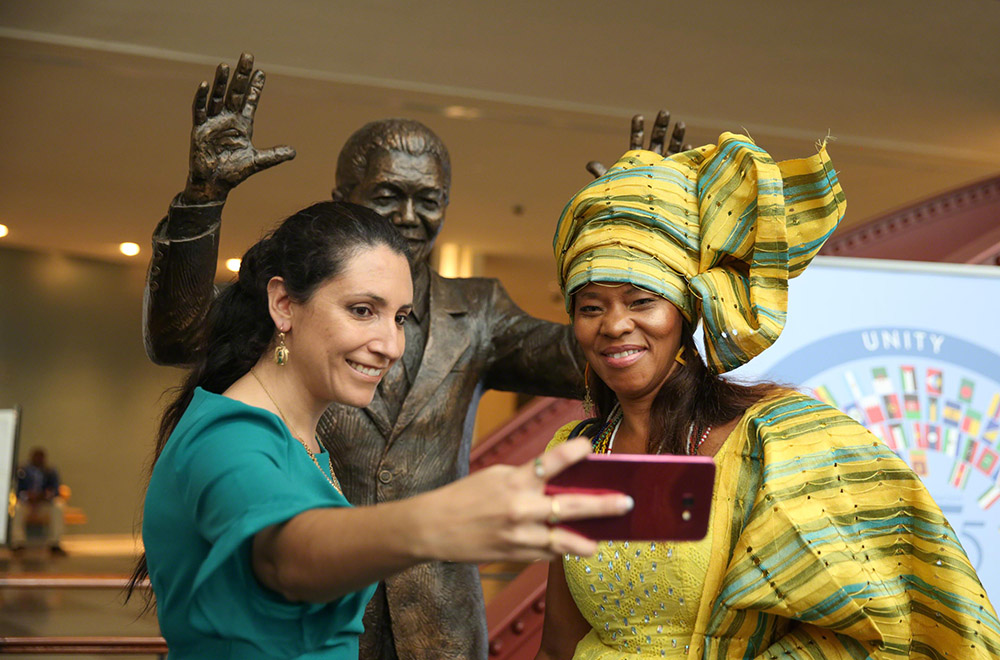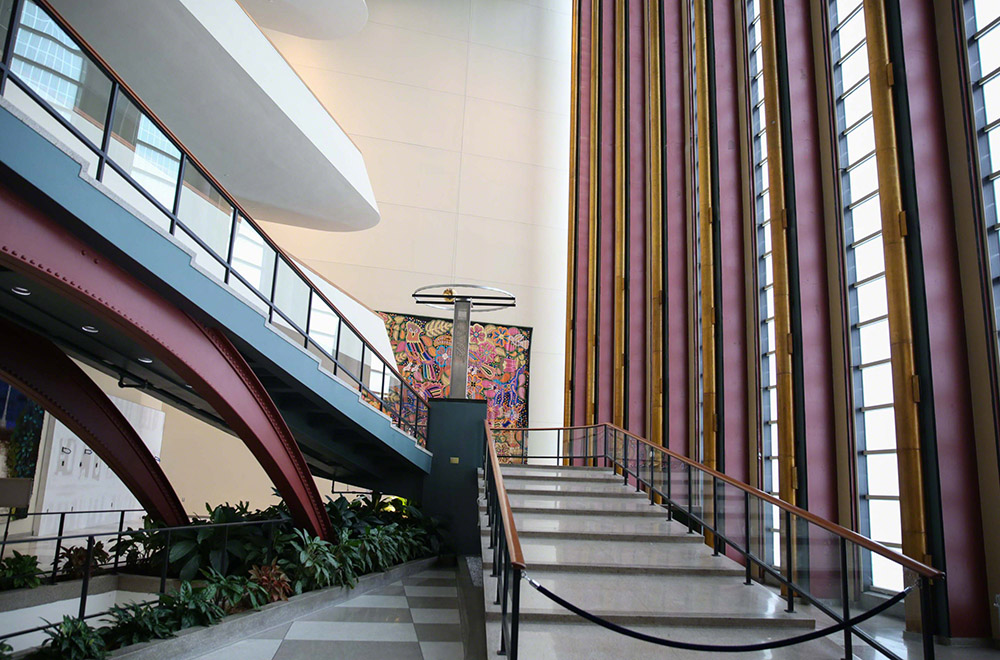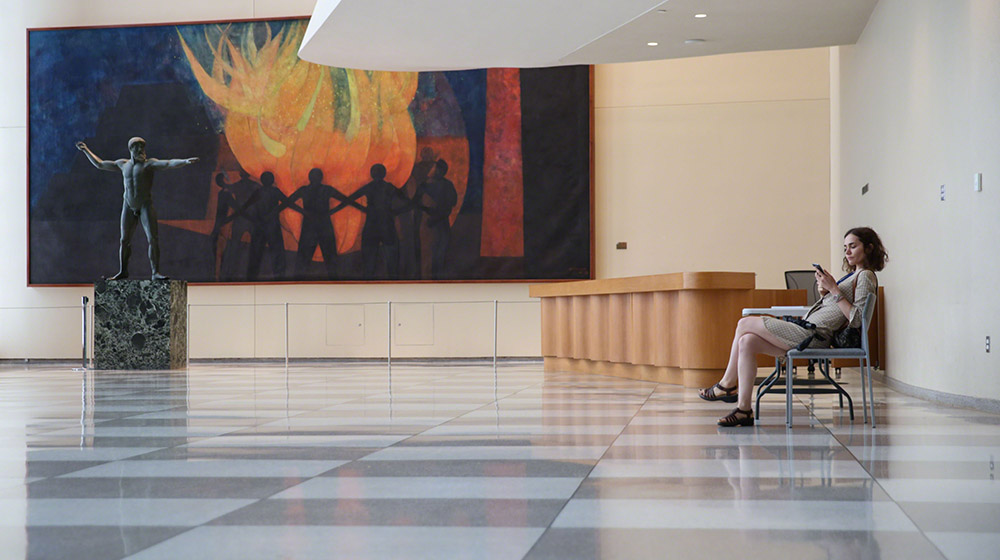Highlights for Thursday, 18 July 2019
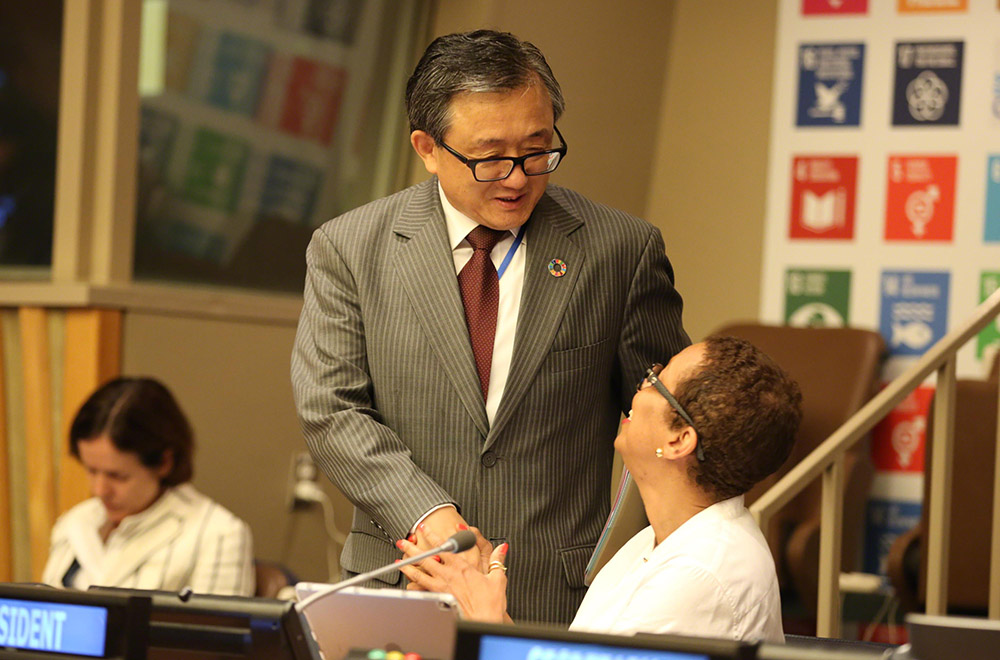
Liu Zhenmin, UN Under-Secretary-General, Economic and Social Affairs, and Inga Rhonda King, President, ECOSOC, share a light moment as HLPF 2019 draws to a close.
 Ten countries presented their voluntary national reviews (VNRs) on Thursday: Cameroon, Tunisia, Congo, Nauru, Guyana, Mauritius, Oman, Liechtenstein, Mauritania, and Turkmenistan.The General Debate continued in parallel in the afternoon, with 37 Heads of State and Government, ministers, and ambassadors making statements, which can be accessed here.A session on lessons learned from the first cycle of HLPF in the evening started with an “intergenerational dialogue” between David Donoghue, co-facilitator of the intergovernmental negotiations on the 2030 Agenda, and Jayathma Wickramanayake, UN Secretary-General’s Envoy on Youth. Wickramanayake called for the empowerment of youth, and fulfillment of the SDGs to ensure young people, constituting half the world’s population, have security, jobs, and opportunities to fulfil their potential. Donoghue said the intention to put “the infinite capacity of young people for activism” at the heart of the 2030 Agenda had not yet been realized, and worried that young people feel “betrayed” by their political institutions.UN Under-Secretary-General Liu Zhenmin listed the achievements of the HLPF so far, including: presentation of 142 VNRs; review of all of the SDGs; organization of regional fora; and stakeholder contributions. Presenting the preliminary and partial results of a survey conducted to inform the upcoming HLPF review process, Zhenmin said respondents believed the HLPF has fulfilled its functions; and the VNRs were useful to share lessons and challenges, advance implementation, and mobilize partners.In a discussion on lessons learned from the first cycle of the HLPF, speakers called for more inclusivity, more time and space for interaction, better use of regional institutions and spaces, a Ministerial Declaration that reflects the outcomes of a session, and better follow-up after a session, among many others.While discussing key messages for the SDG Summit, speakers highlighted the strong country ownership of the SDGs evidenced by national polices and actions; local-level reflection; and budgetary allocations for the SDGs. The challenges listed included difficulties in long-term planning, awareness building, and resource mobilization. Proposed focus areas included: a better understanding of interlinkages; the role of science, technology, and innovation in enabling co-benefits; governance, for integration and coordination; accurate and timely data for informed decision-making; gender equality and empowerment of women and girls; partnerships, including international cooperation; and regional forums that enable a space for peer learning and showcasing practical solutions.In the closing session, ECOSOC President King introduced the draft procedural report of the 2019 HLPF (E/HLPF/2019/L.1), which was adopted without amendments. Deputy Secretary-General Amina J. Mohammed highlighted three main areas: “the inclusion imperative”; democratic and effective institutions; and political commitment.The meeting was gaveled to a close at 6:04 pm.For more details on the day’s events and to hear what delegates said in the corridors, see our daily Earth Negotiations Bulletin (ENB).
Ten countries presented their voluntary national reviews (VNRs) on Thursday: Cameroon, Tunisia, Congo, Nauru, Guyana, Mauritius, Oman, Liechtenstein, Mauritania, and Turkmenistan.The General Debate continued in parallel in the afternoon, with 37 Heads of State and Government, ministers, and ambassadors making statements, which can be accessed here.A session on lessons learned from the first cycle of HLPF in the evening started with an “intergenerational dialogue” between David Donoghue, co-facilitator of the intergovernmental negotiations on the 2030 Agenda, and Jayathma Wickramanayake, UN Secretary-General’s Envoy on Youth. Wickramanayake called for the empowerment of youth, and fulfillment of the SDGs to ensure young people, constituting half the world’s population, have security, jobs, and opportunities to fulfil their potential. Donoghue said the intention to put “the infinite capacity of young people for activism” at the heart of the 2030 Agenda had not yet been realized, and worried that young people feel “betrayed” by their political institutions.UN Under-Secretary-General Liu Zhenmin listed the achievements of the HLPF so far, including: presentation of 142 VNRs; review of all of the SDGs; organization of regional fora; and stakeholder contributions. Presenting the preliminary and partial results of a survey conducted to inform the upcoming HLPF review process, Zhenmin said respondents believed the HLPF has fulfilled its functions; and the VNRs were useful to share lessons and challenges, advance implementation, and mobilize partners.In a discussion on lessons learned from the first cycle of the HLPF, speakers called for more inclusivity, more time and space for interaction, better use of regional institutions and spaces, a Ministerial Declaration that reflects the outcomes of a session, and better follow-up after a session, among many others.While discussing key messages for the SDG Summit, speakers highlighted the strong country ownership of the SDGs evidenced by national polices and actions; local-level reflection; and budgetary allocations for the SDGs. The challenges listed included difficulties in long-term planning, awareness building, and resource mobilization. Proposed focus areas included: a better understanding of interlinkages; the role of science, technology, and innovation in enabling co-benefits; governance, for integration and coordination; accurate and timely data for informed decision-making; gender equality and empowerment of women and girls; partnerships, including international cooperation; and regional forums that enable a space for peer learning and showcasing practical solutions.In the closing session, ECOSOC President King introduced the draft procedural report of the 2019 HLPF (E/HLPF/2019/L.1), which was adopted without amendments. Deputy Secretary-General Amina J. Mohammed highlighted three main areas: “the inclusion imperative”; democratic and effective institutions; and political commitment.The meeting was gaveled to a close at 6:04 pm.For more details on the day’s events and to hear what delegates said in the corridors, see our daily Earth Negotiations Bulletin (ENB).
IISD Reporting Services, through its ENB Meeting Coverage, provided daily web coverage and daily reports from HLPF 2019. In addition, IISD Reporting Services has published a summary and analysis report from the meeting, which is now available in HTML and PDF.
Photos by IISD/ENB | Kiara Worth
For photo reprint permissions, please follow instructions at our Attribution Regulations for Meeting Photo Usage Page.
Voluntary National Reviews
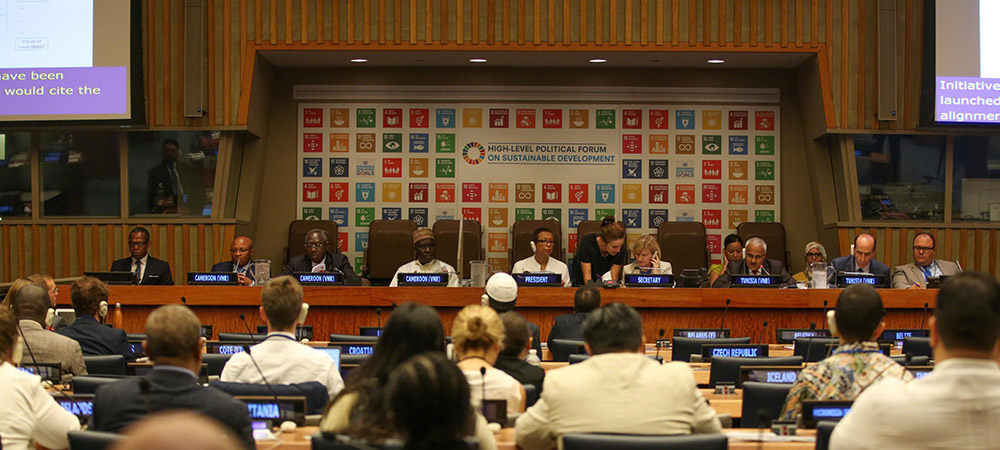
Ten VNRs were presented throughout the day.
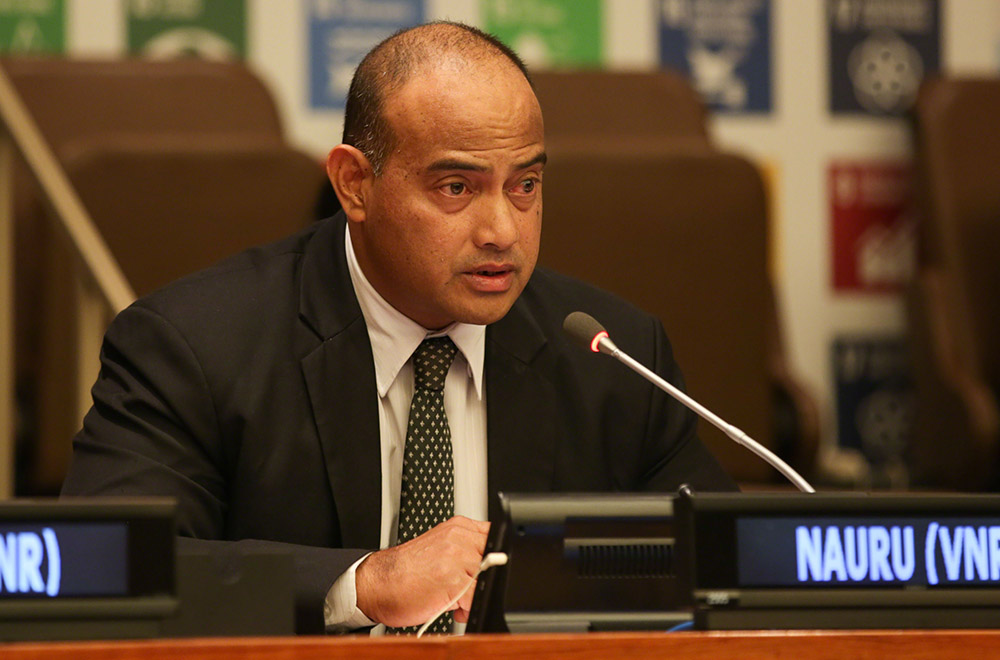
David Adeang, Minister for Finance and Sustainable Development, Nauru
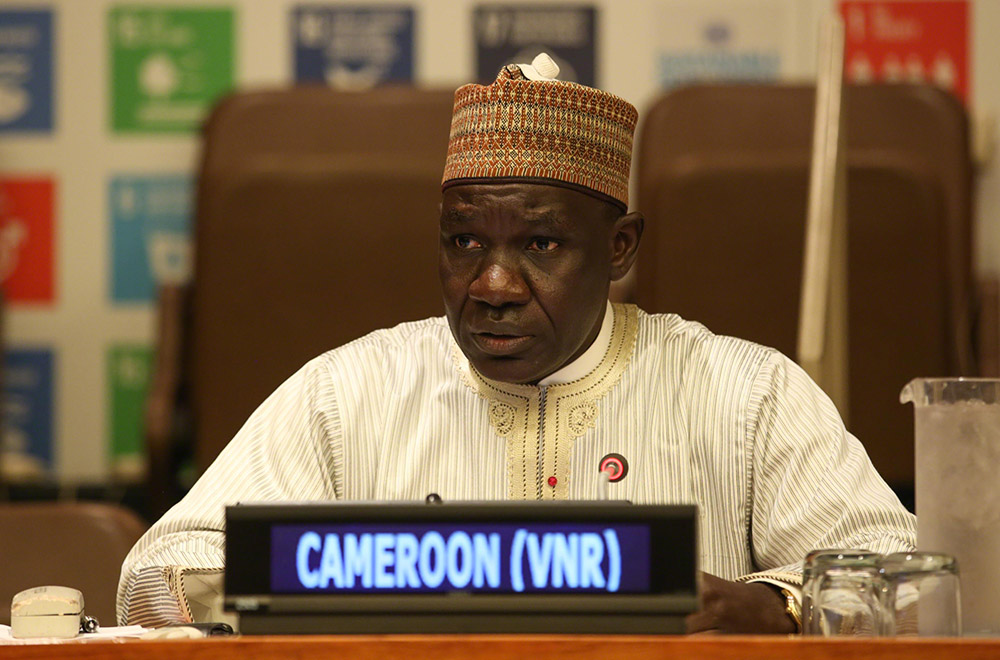
Alamine Ousmane Mey, Minister of the Economy, Planning and Regional Development, Cameroon

Ingrid Olga Ghislaine Ebouka-Babackas, Minister of Planning, Statistics, and Regional Integration, Congo

Belgacem Ayed, Ministry of Development, Investment, and International Cooperation, Tunisia
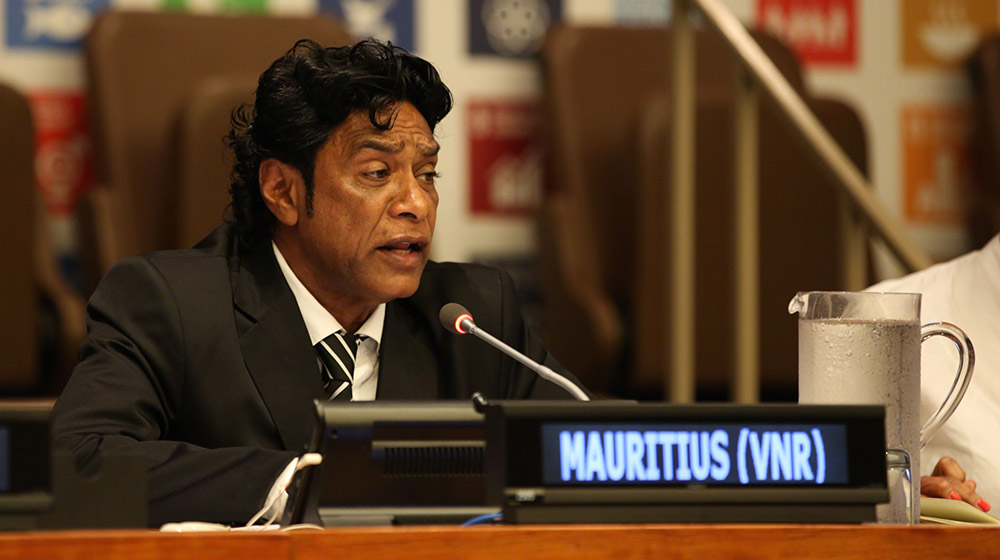
Nandcoomar Bodha, Minister of Foreign Affairs, Regional Integration, and International Trade, and Minister of Public Infrastructure and Land Transport, Mauritius
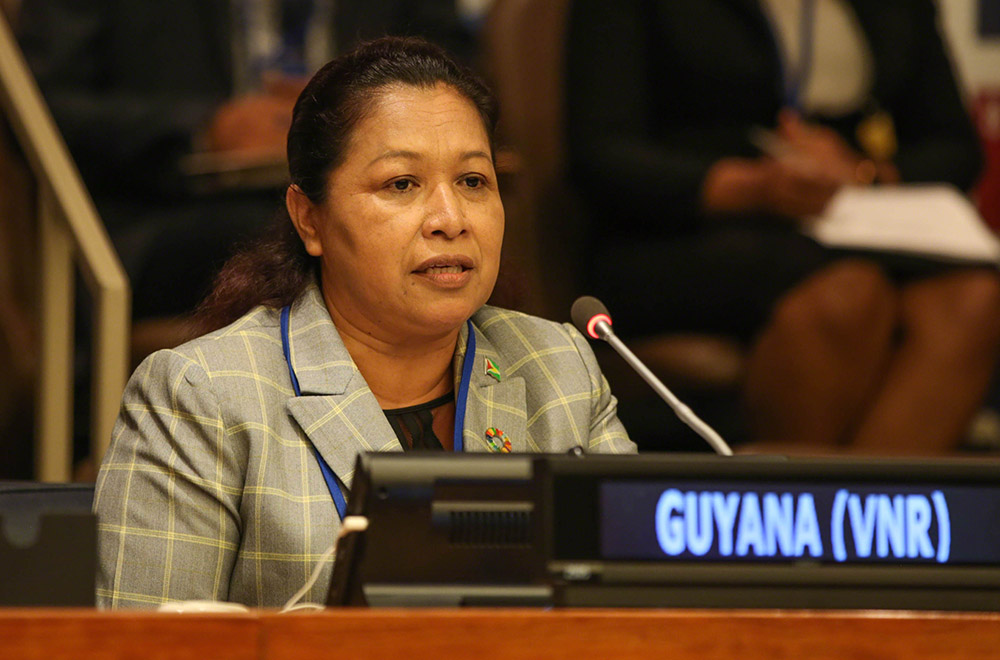
Dawn Hastings-Williams, Minister of State, Guyana
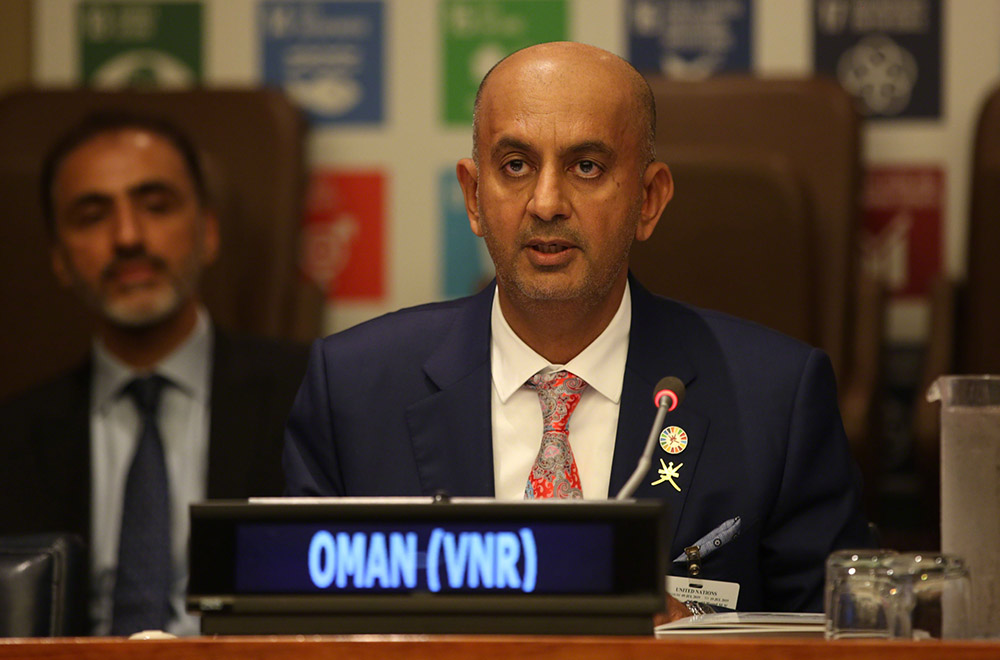
Ali Masoud Ali Al Sunaidy, Minister of Commerce and Industry, Oman
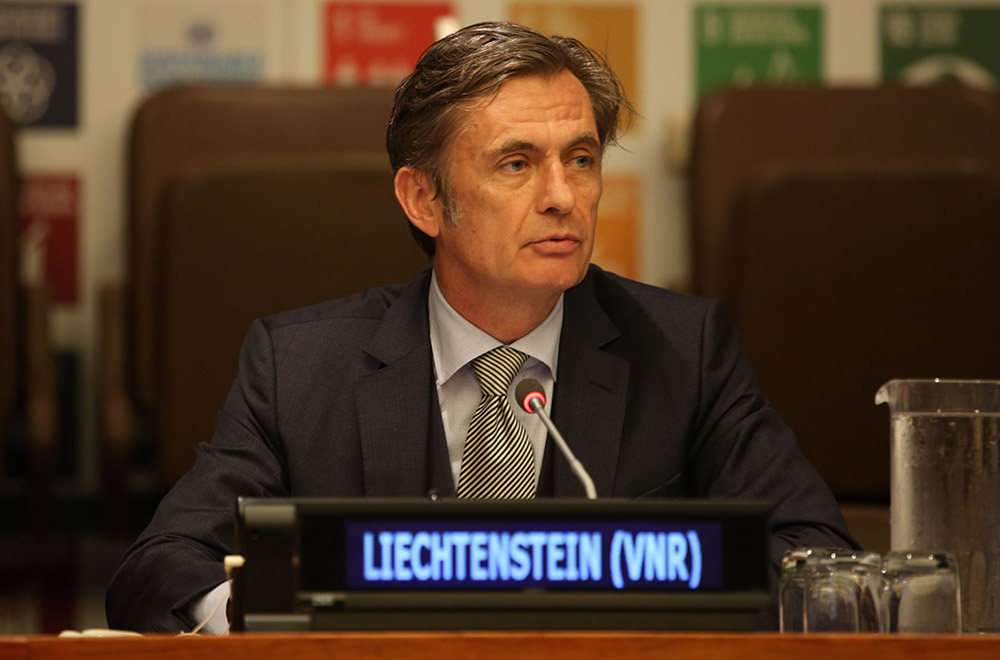
Christian Wenaweser, Permanent Representative of Liechtenstein to the UN
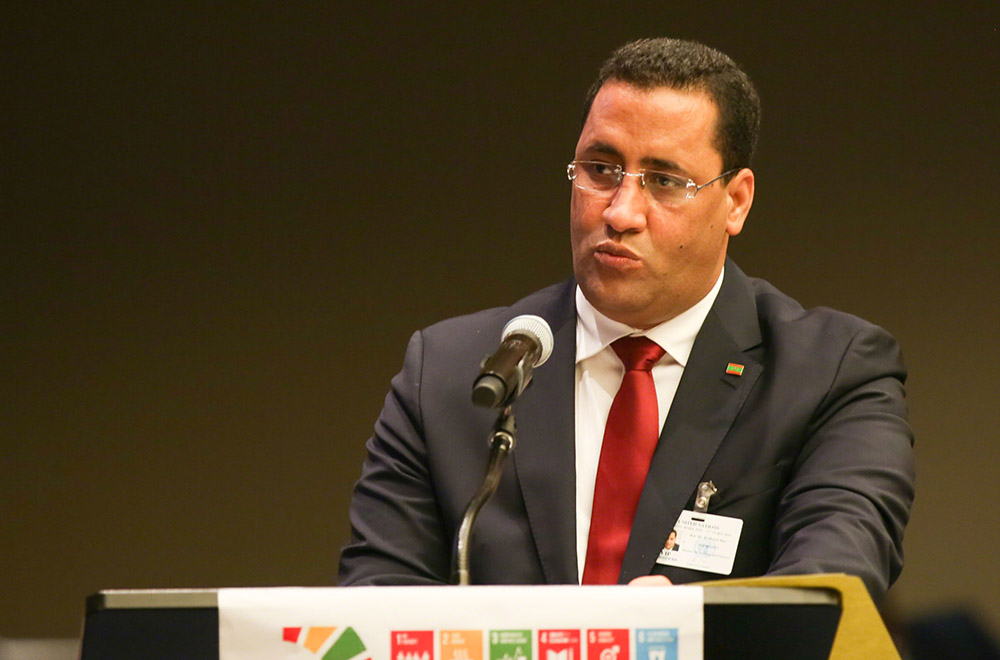
El Moctar Djay, Minister of Economy and Finance, Mauritania
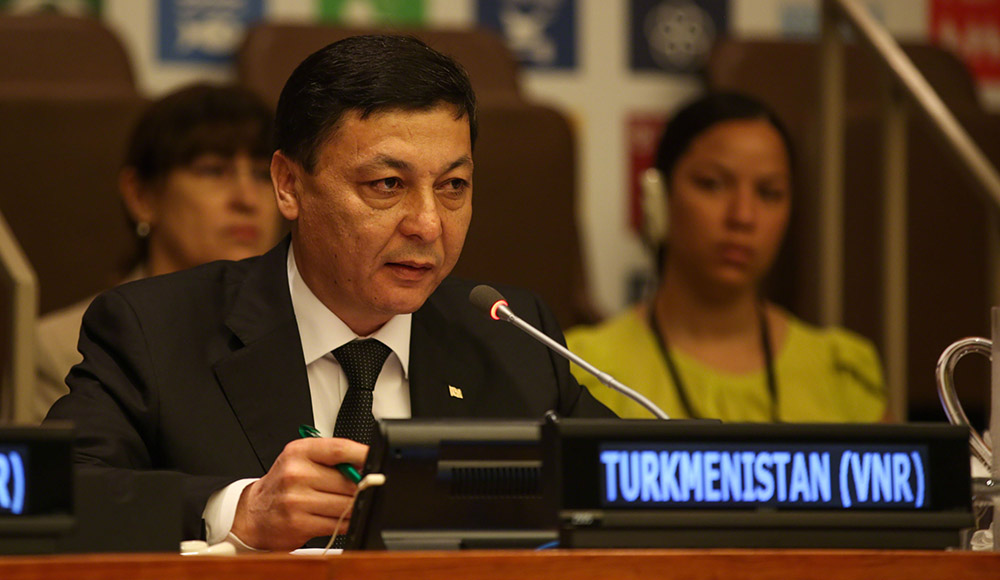
Batyr Bazarov, Minister of Finance and Economy, Turkmenistan
Lessons Learned from the First Cycle of HLPF and Messages for the 2019 HLPF Summit
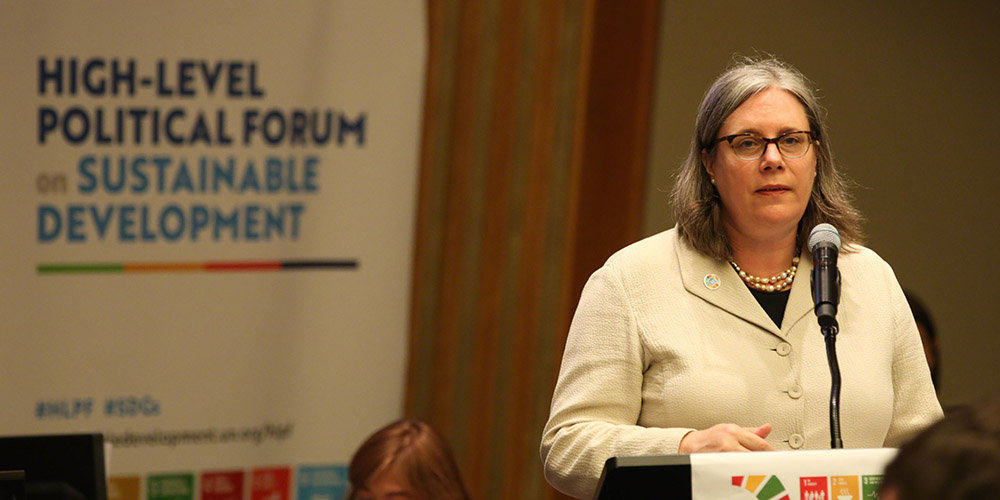
Helen Mountford, Vice-President for Climate and Economics, World Resources Institute (WRI), moderated the event, which focused on what Heads of State and Government should know and how the HLPF can be improved.

David Donoghue, co-facilitator of the intergovernmental negotiations on the 2030 Agenda and Distinguished Fellow, Overseas Development Institute (ODI)
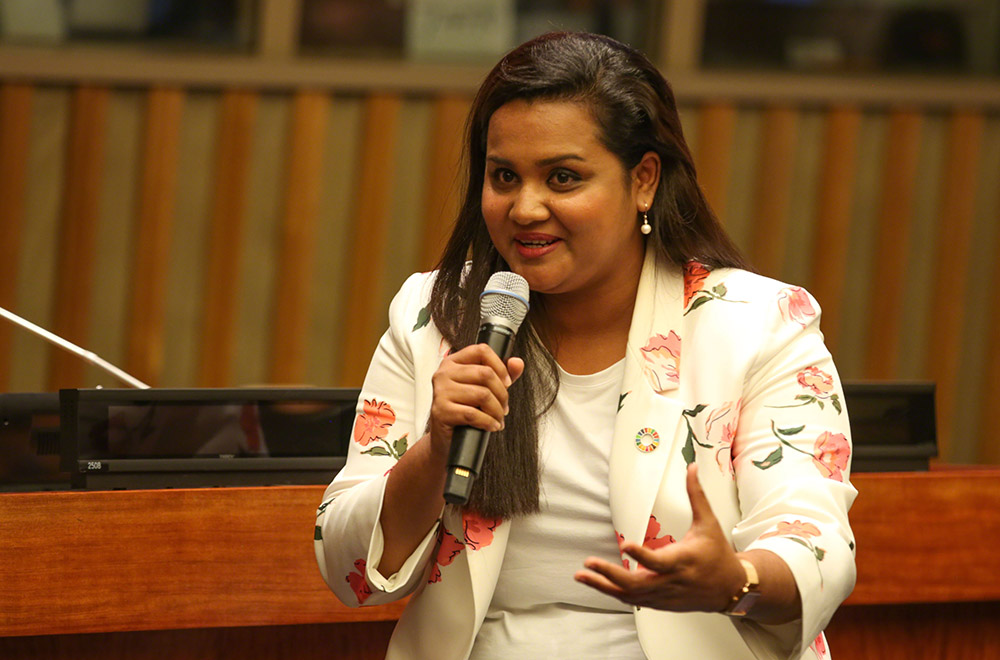
Jayathma Wickramanayake, UN Secretary-General’s Envoy on Youth
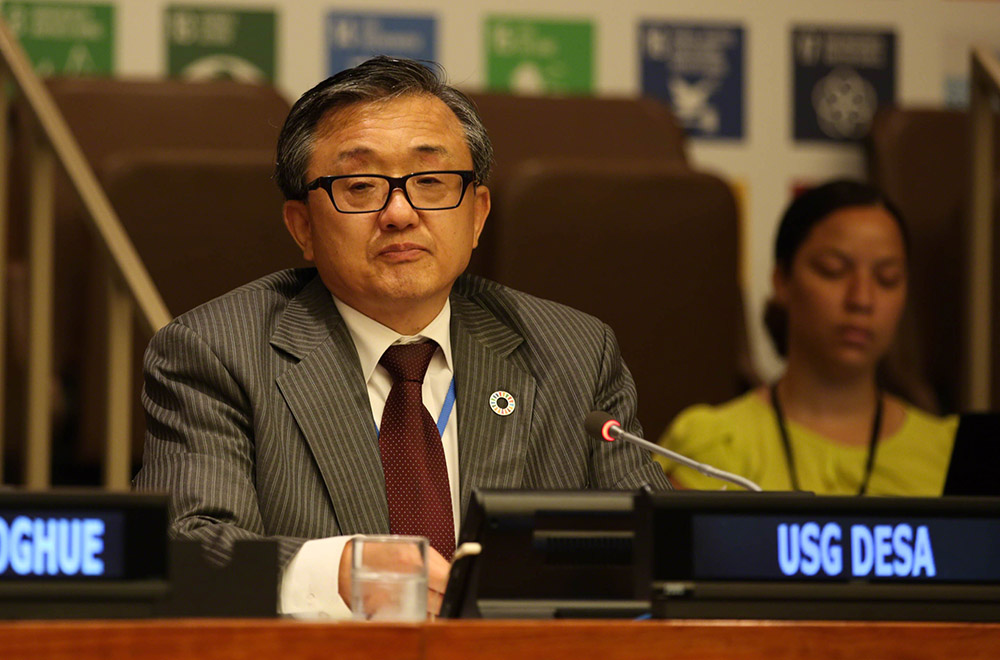
Liu Zhenmin, UN Under-Secretary-General, Economic and Social Affairs
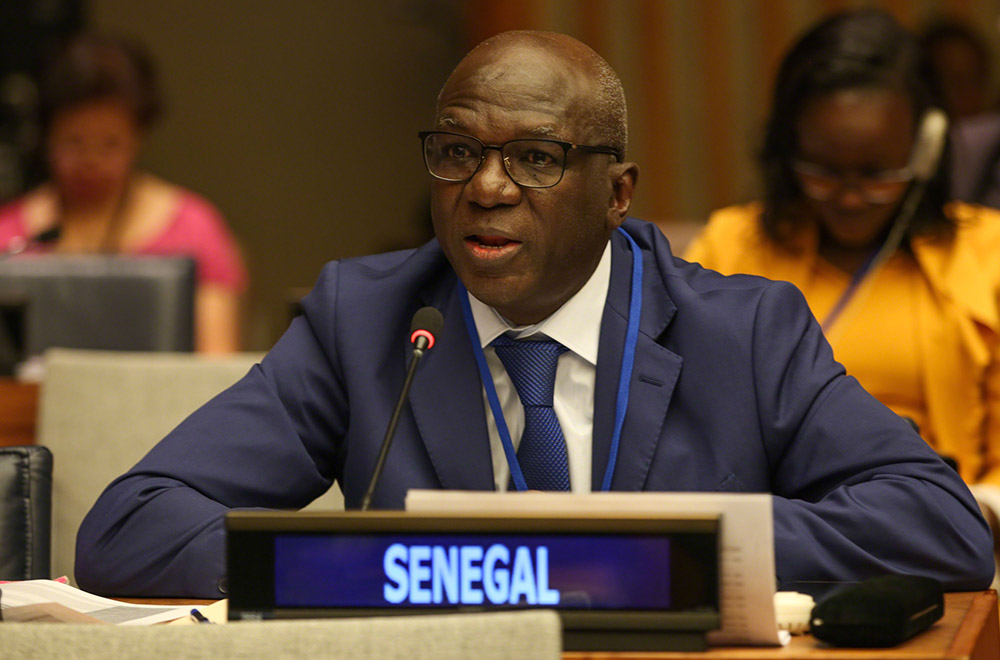
Oumar Bassirou Diop, Ministry of Economy, Planning, and Cooperation, Senegal
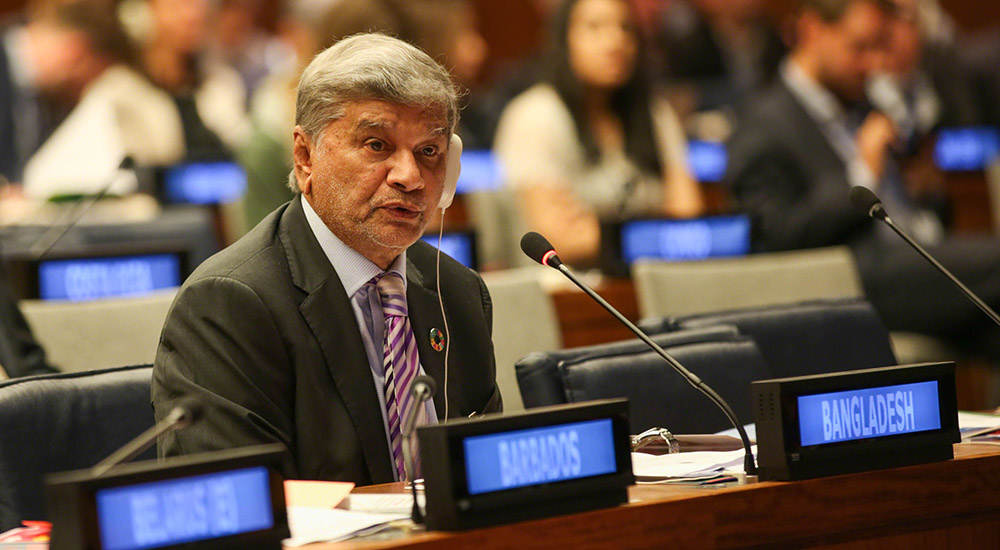
Muhammad Abdul Mannan, Minister of Planning, Bangladesh
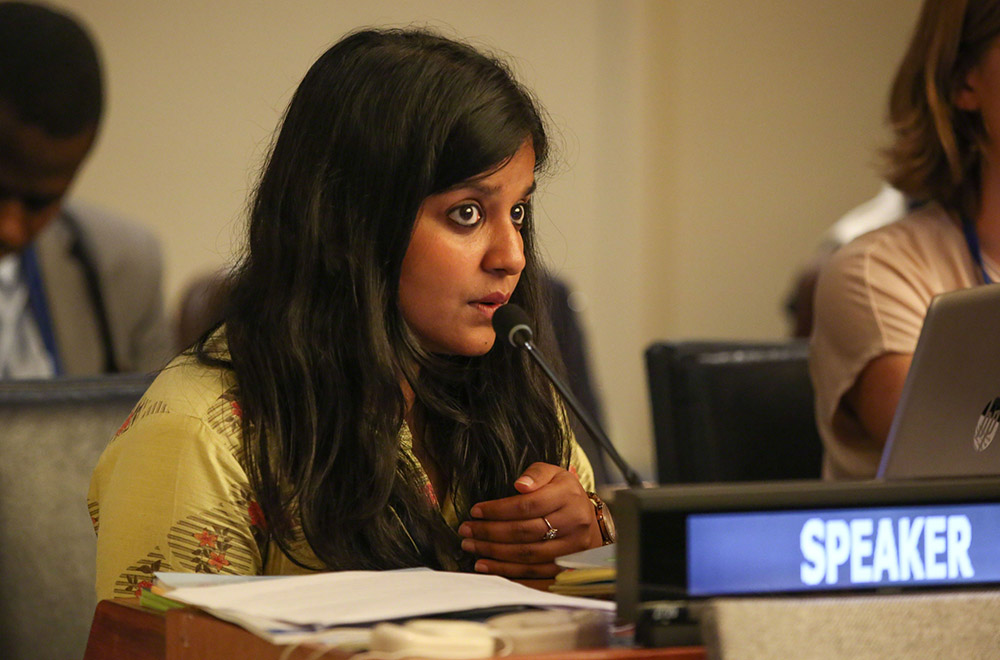
Saumya Aggarwal, Co-Founder, Youth for Peace International
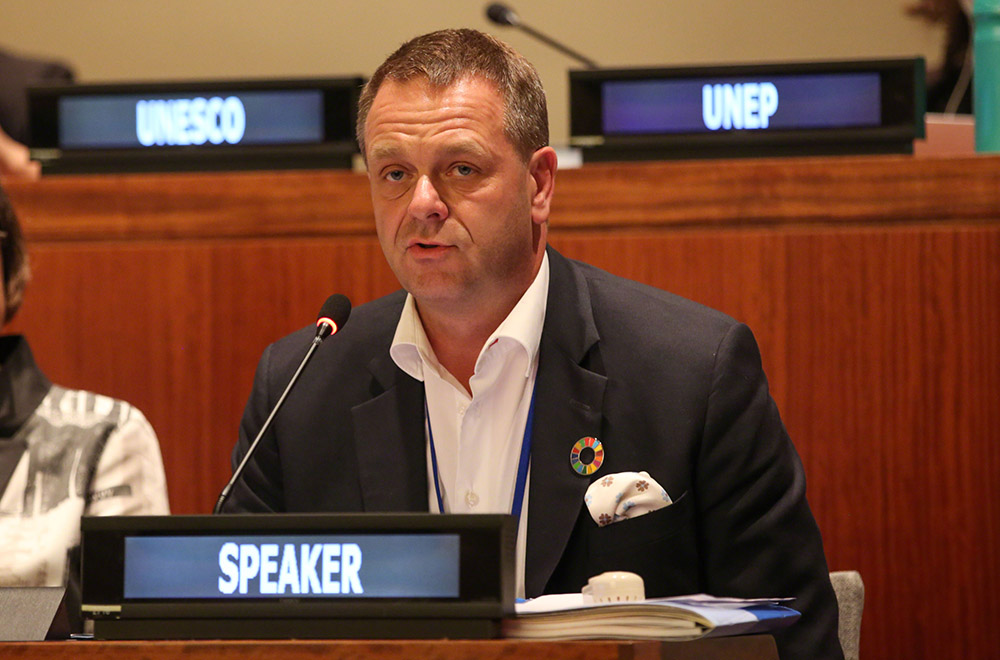
Jan Vapaavuori, Mayor of Helsinki, Finland
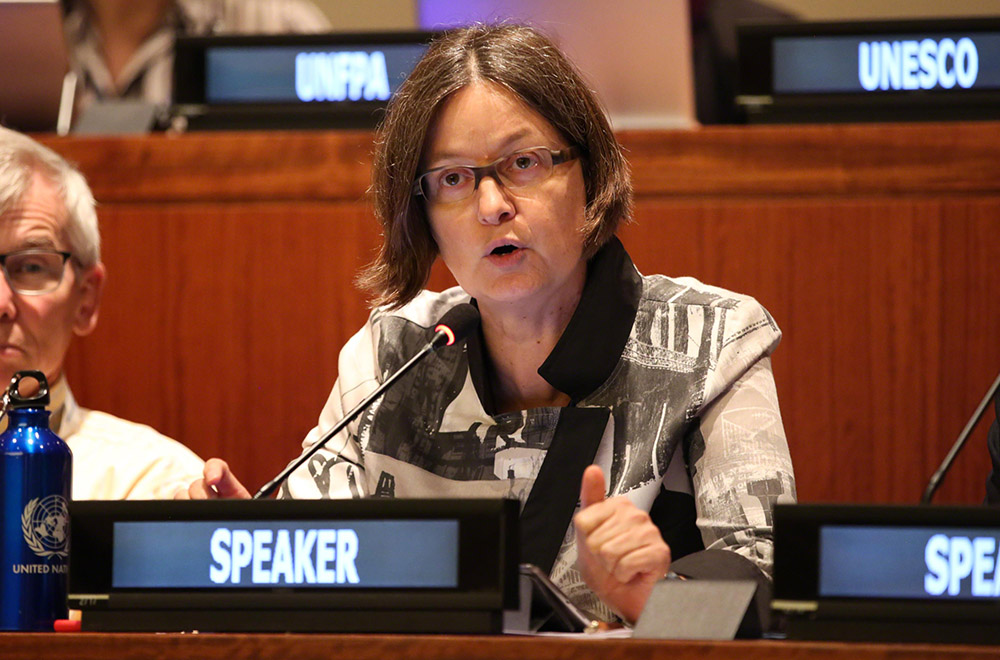
Marianne Beisheim, German Institute for International and Security Affairs
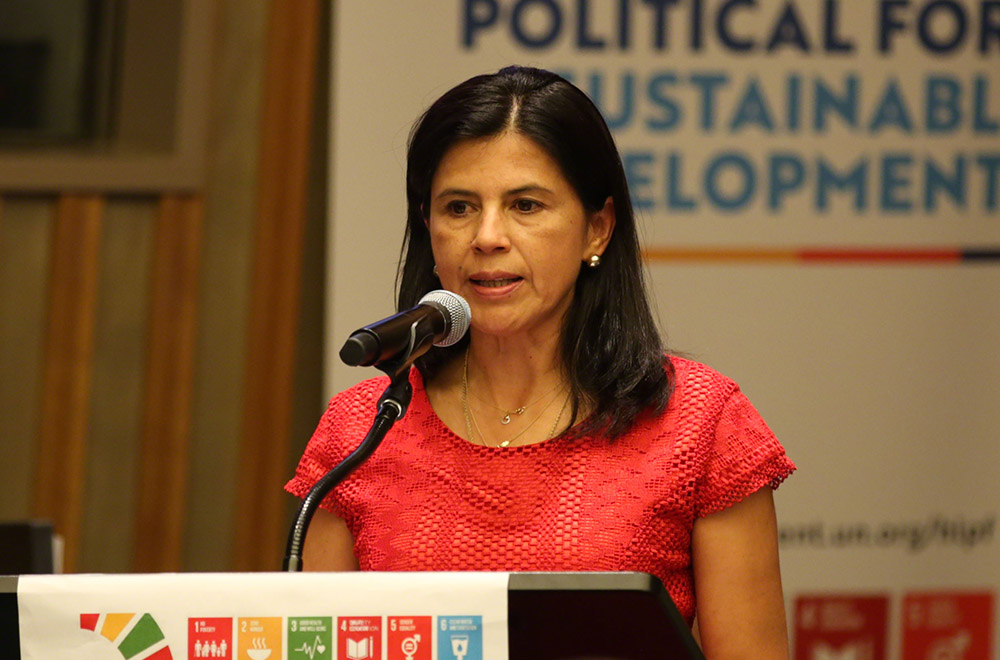
Gloria Amparo Alonso Másmela, Minister of National Planning, Colombia
General Debate
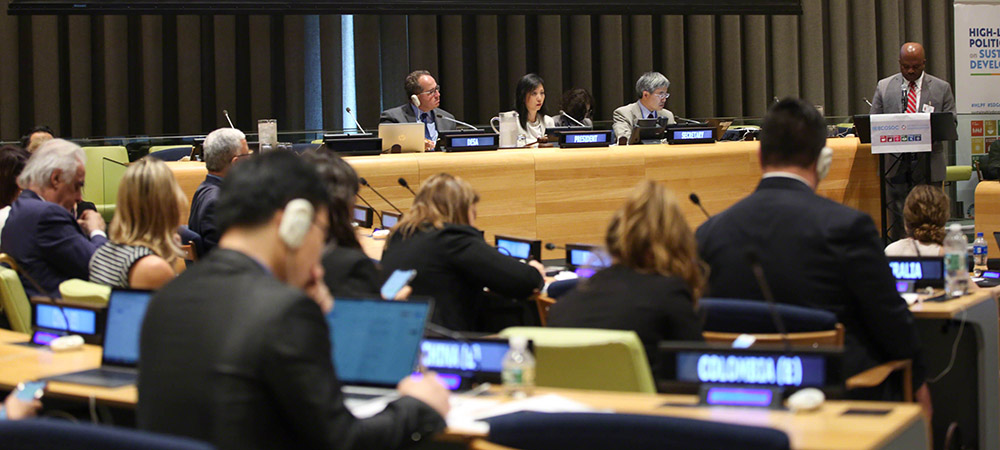
View of the dais during the General Debate.
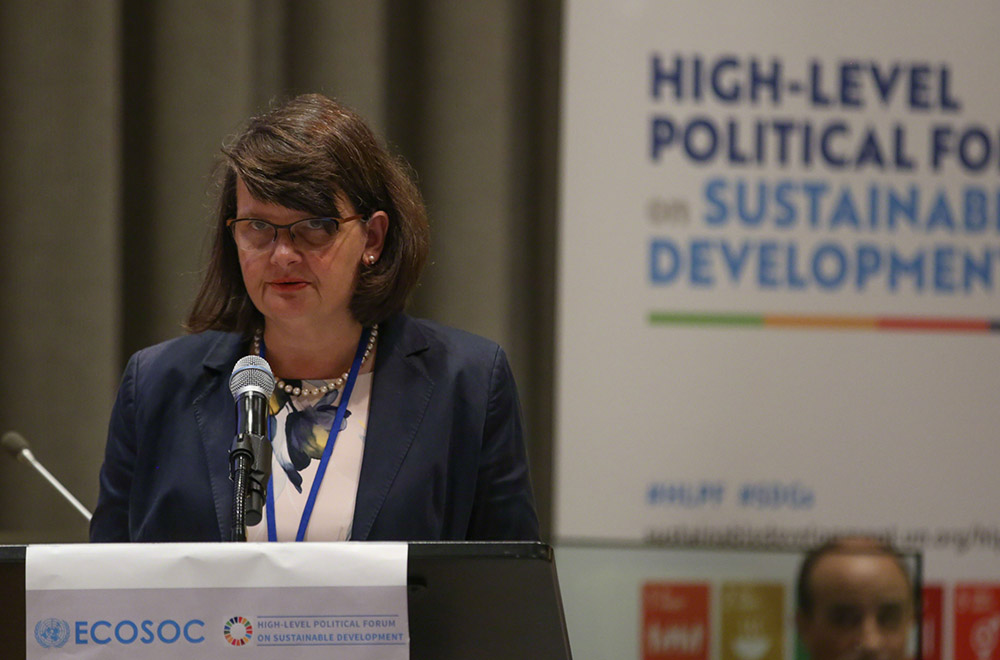
Maria Flachsbarth, Parliamentary State Secretary to the Federal Minister for Economic Cooperation and Development, Germany
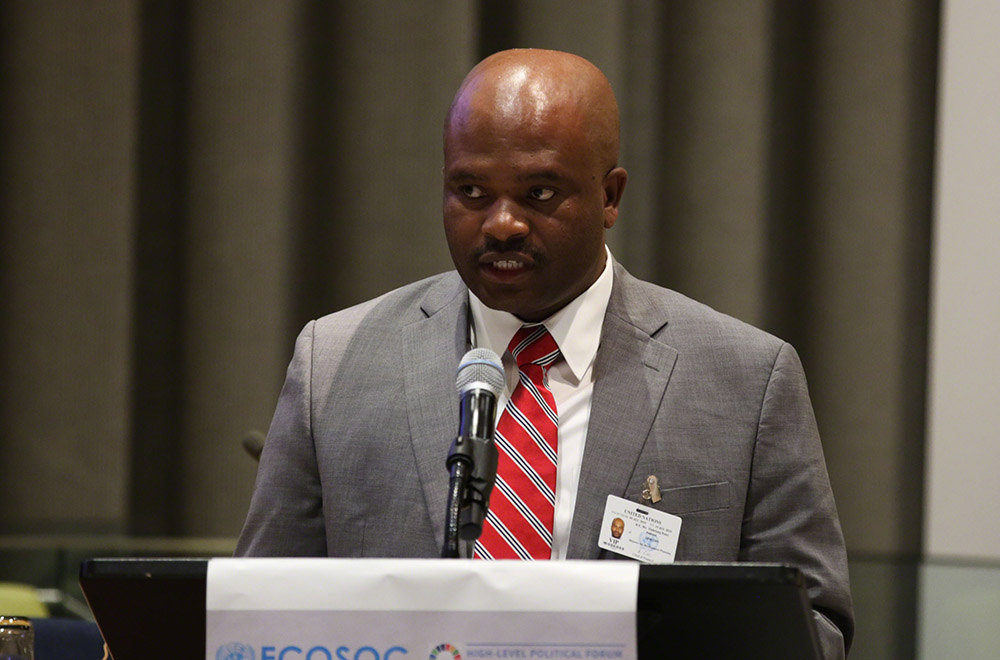
Tlohelang Aumane, Minister of Development Planning, Lesotho
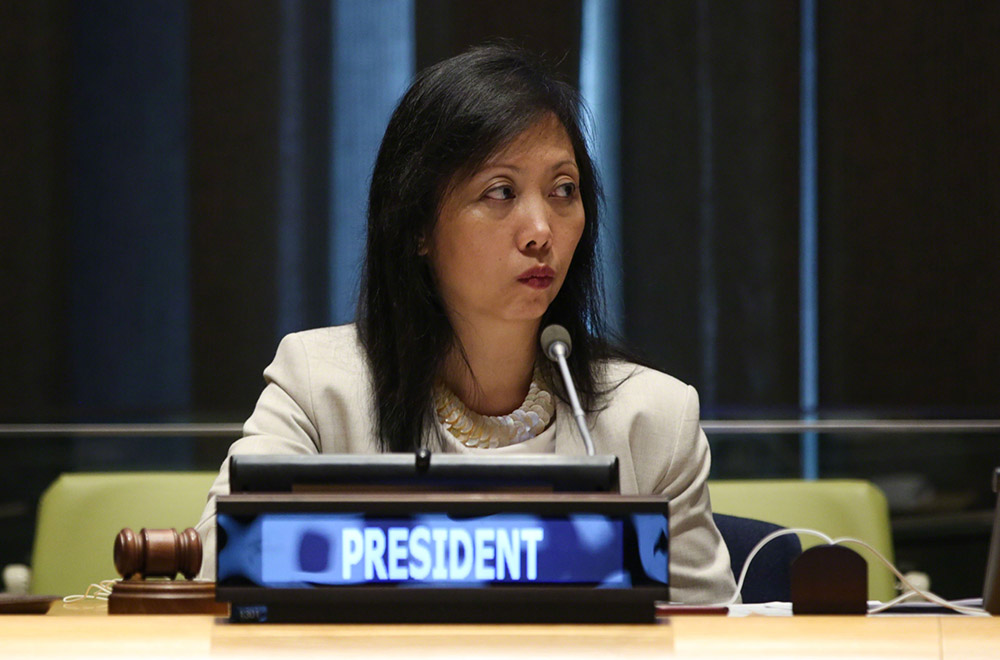
Kira Christianne Danganan Azucena, Vice-President, ECOSOC
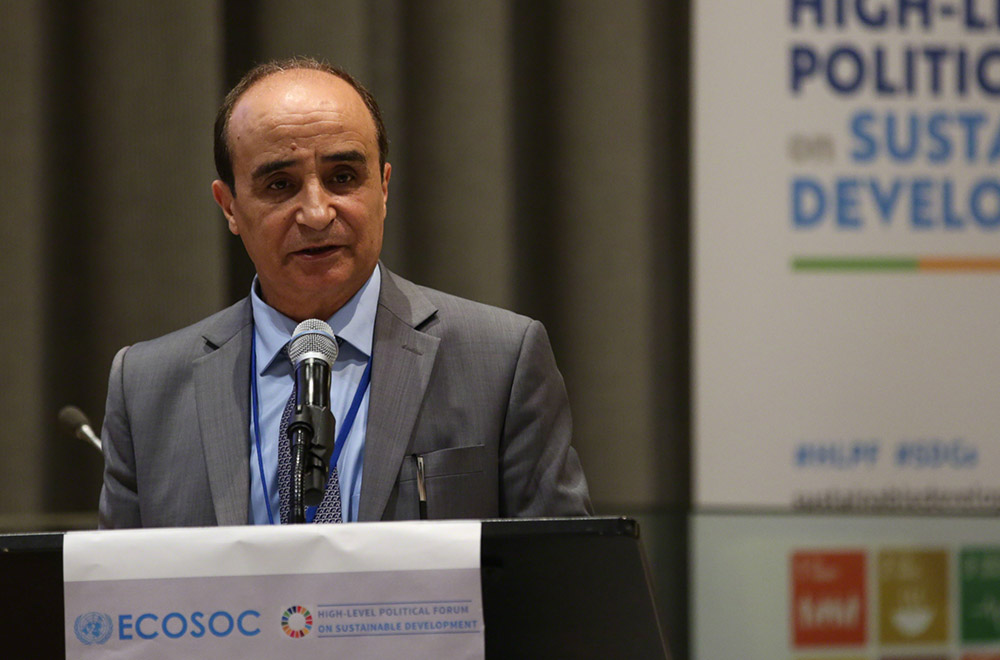
Rachid Bladehane, Permanent Secretary-General, Ministry of Foreign Affairs, Algeria
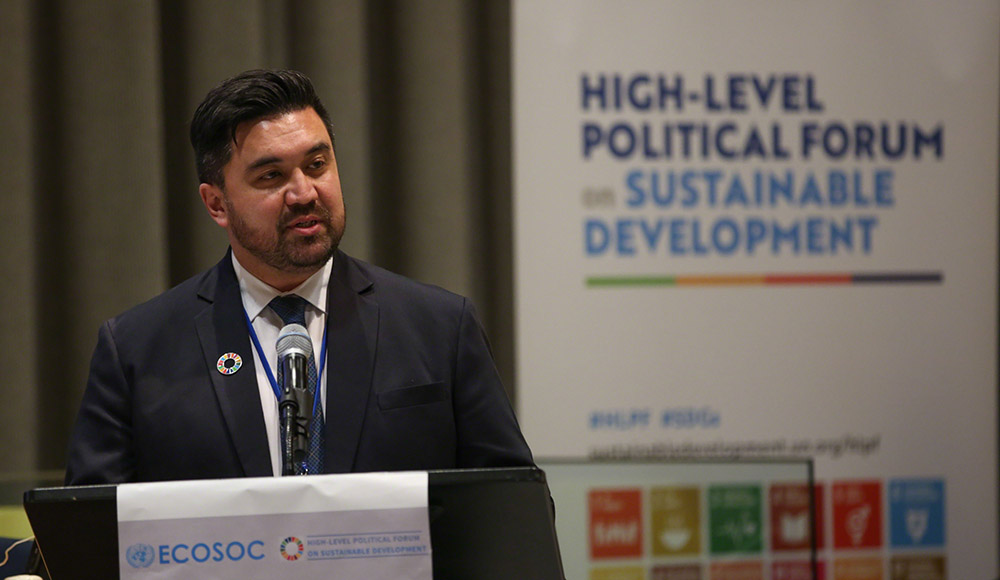
Nigel Bruce, Department of Foreign Affairs and Trade, Australia
Closing of the HLPF
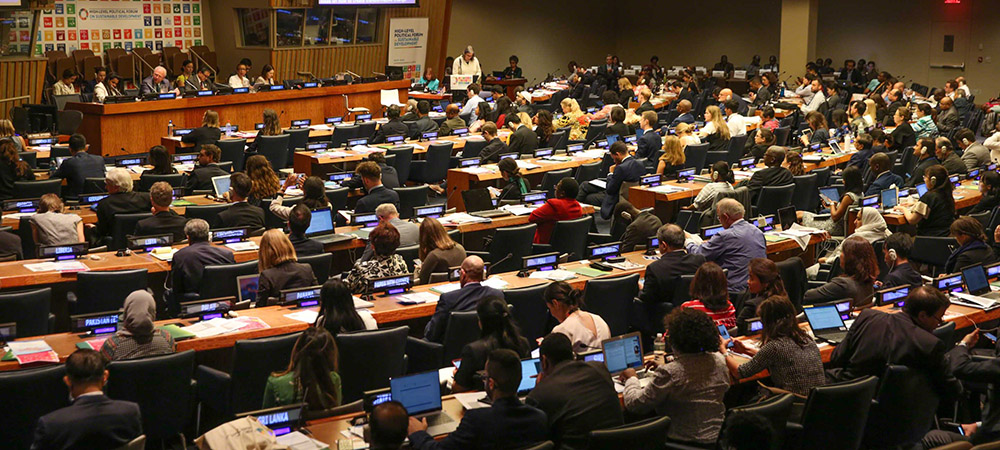
Delegates gather for the closing of HLPF.
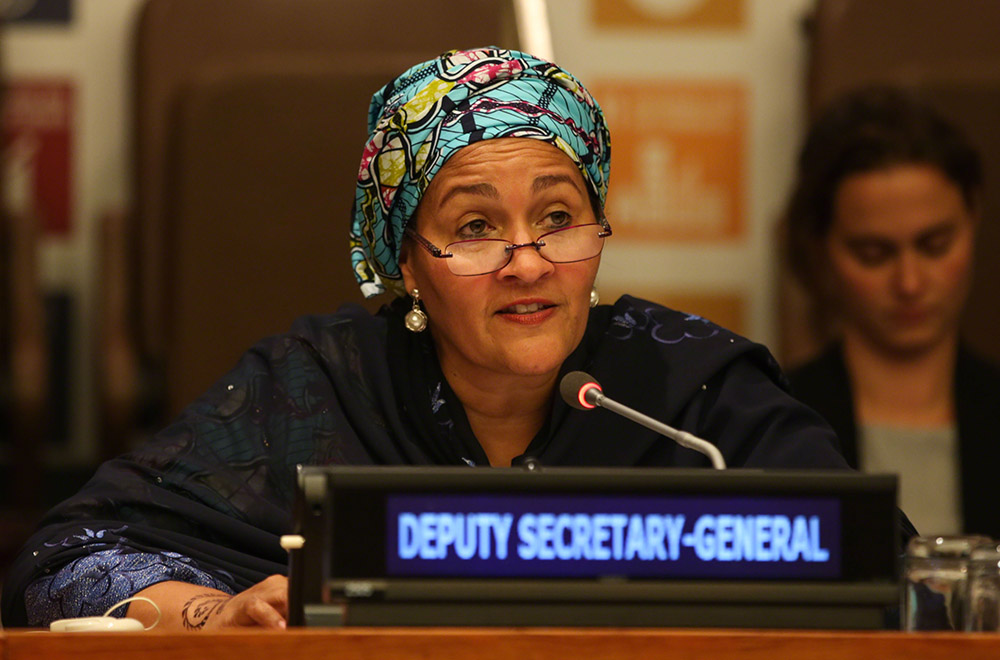
Amina J. Mohammed, Deputy Secretary-General of the United Nations
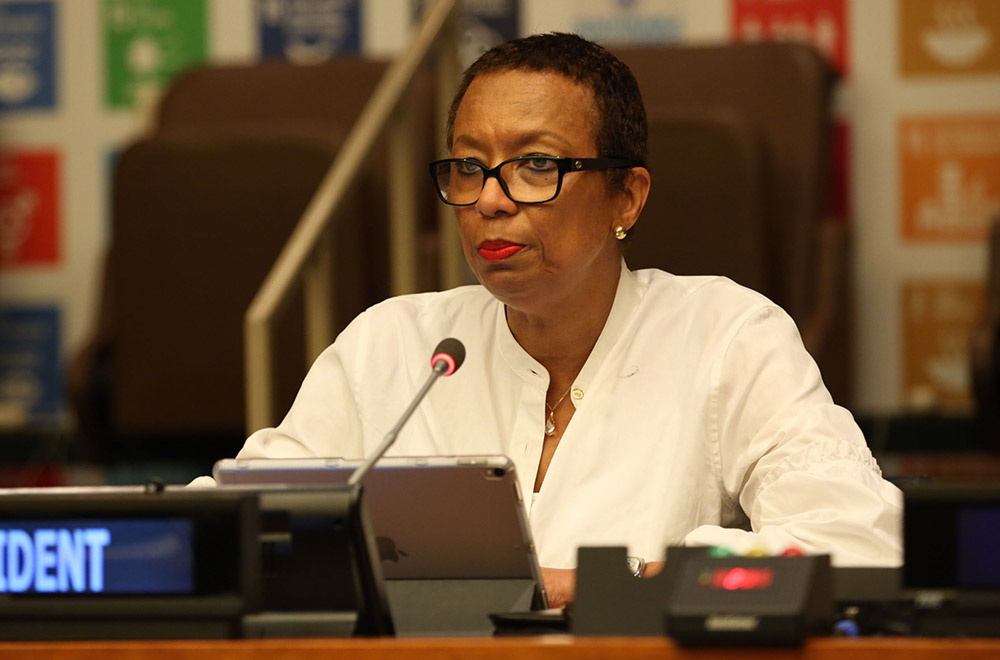
Inga Rhonda King, President, ECOSOC
Nelson Mandela Day
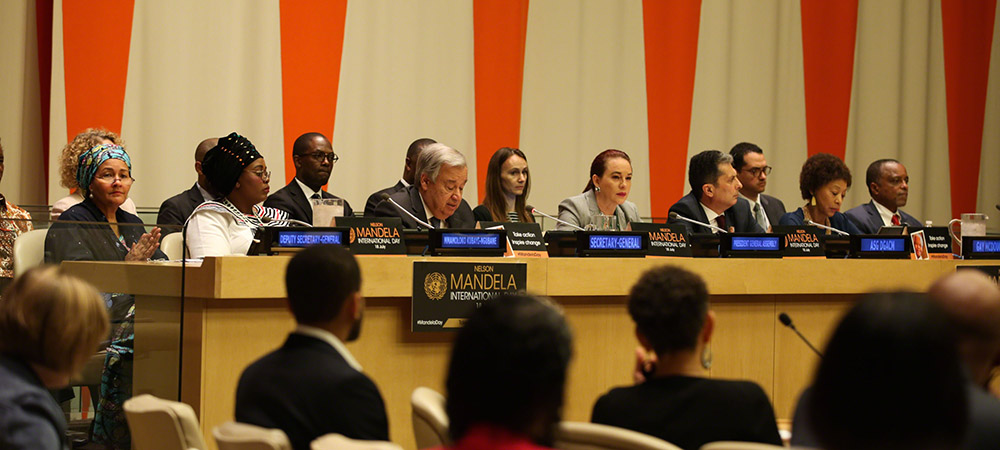
UN Deputy Secretary-General Amina J. Mohammed; Mmamoloko Kubayi-Ngubane, Minister of Tourism, South Africa; UN Secretary-General António Guterres; María Fernanda Espinosa, President, UN General Assembly; Movses Abelian, General Assembly and Conference Management, UN; Gay McDougall, International Human Rights Lawyer; and Phillip Thompson, Deputy Mayor, New York City, attend the special event to celebrate International Nelson Mandela Day.
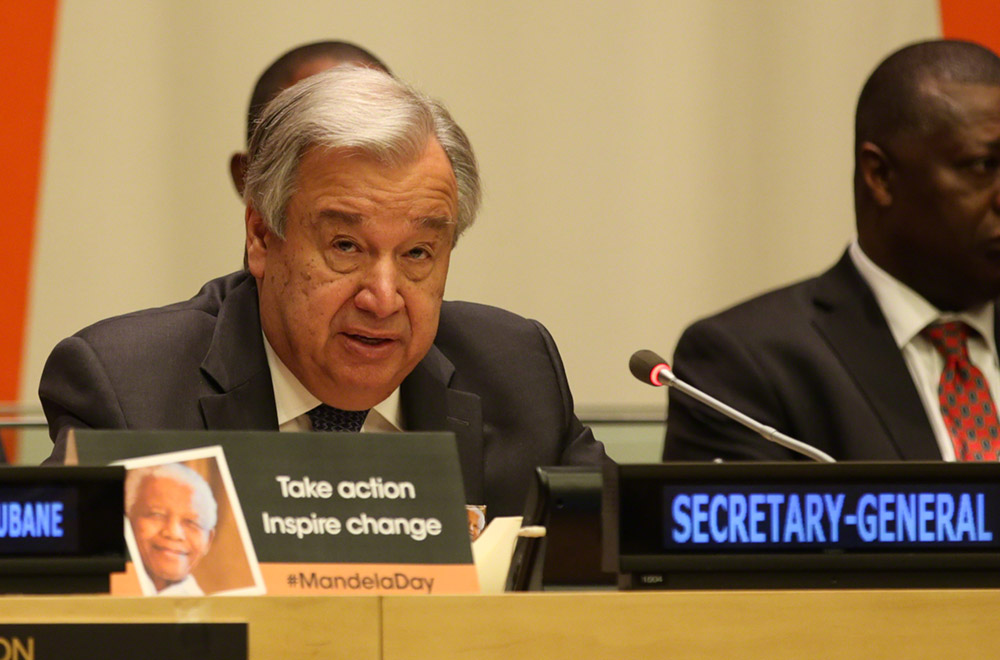
UN Secretary-General António Guterres
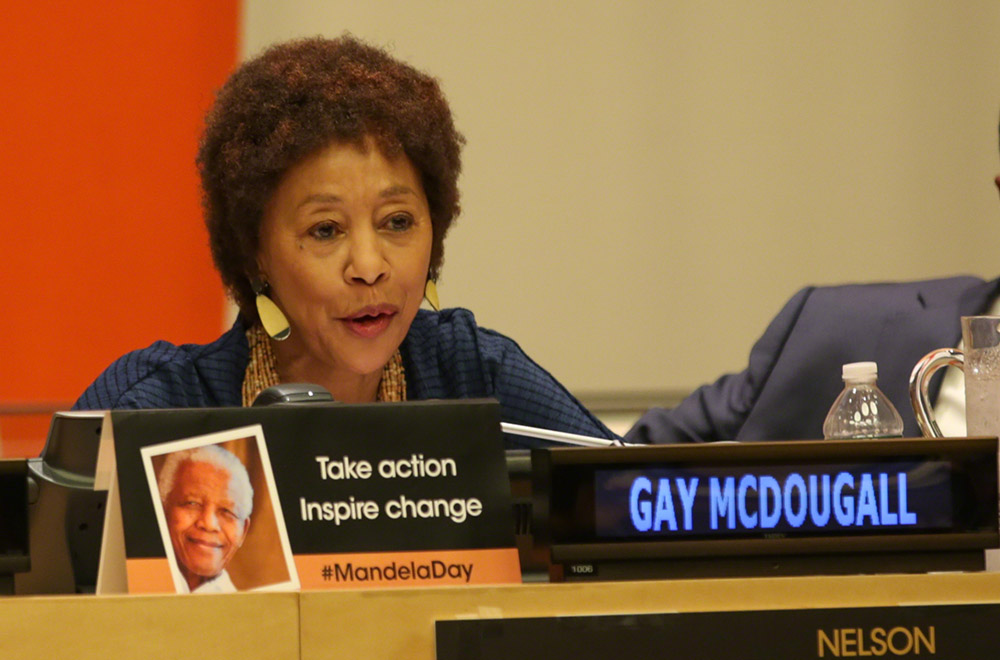
Gay McDougall, International Human Rights Lawyer
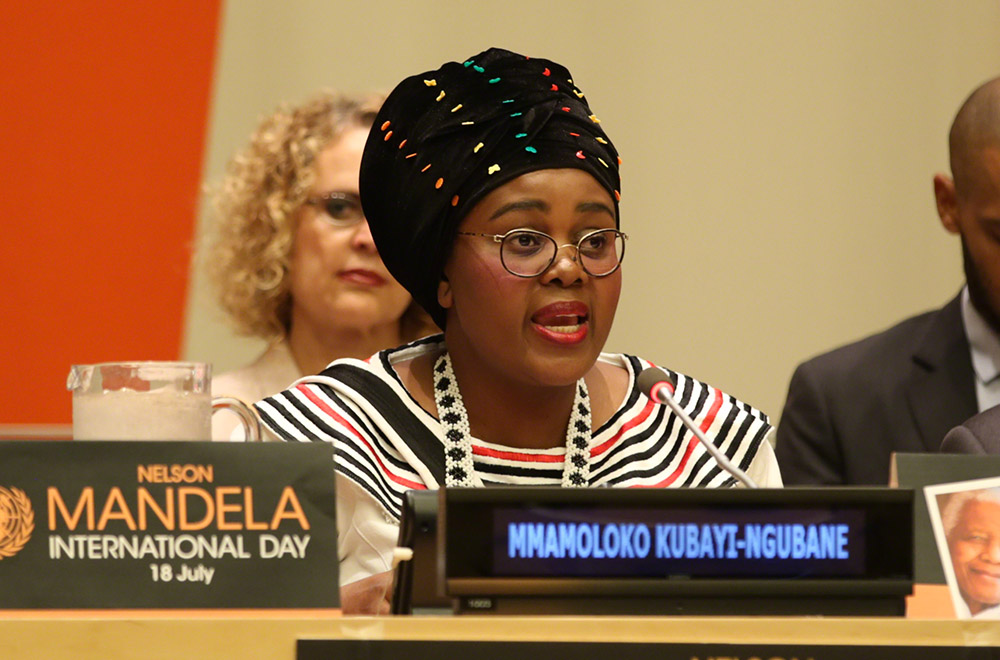
Mmamoloko Kubayi-Ngubane, Minister of Tourism, South Africa
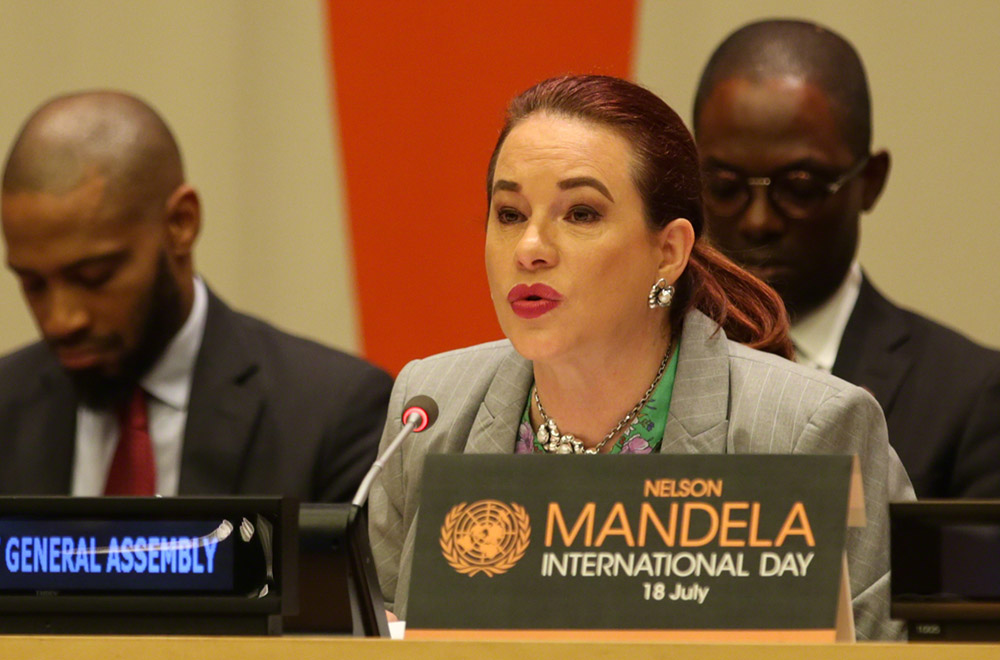
María Fernanda Espinosa, President, UN General Assembly
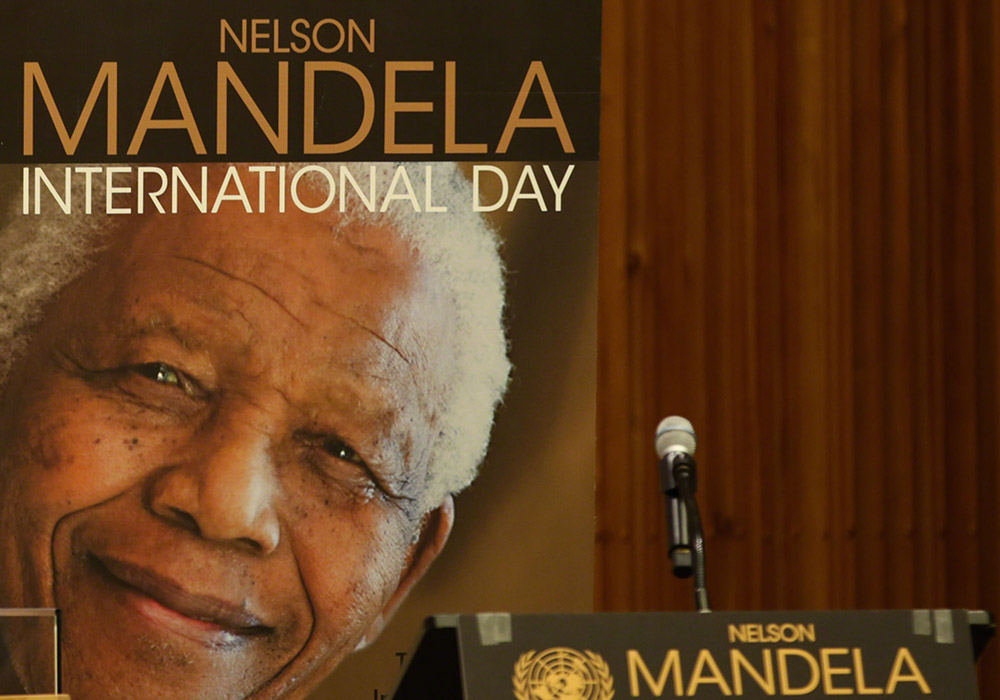
This year, which would have been Nelson Mandela's 101st birthday, the theme of Nelson Mandela International Day was ‘Take action, Inspire change.’ A call was made for everyone to commit themselves to 67 minutes of service throughout the day, in recognition of the 67 years that Nelson Mandela spent fighting for South Africa’s freedom.
Around the Venue
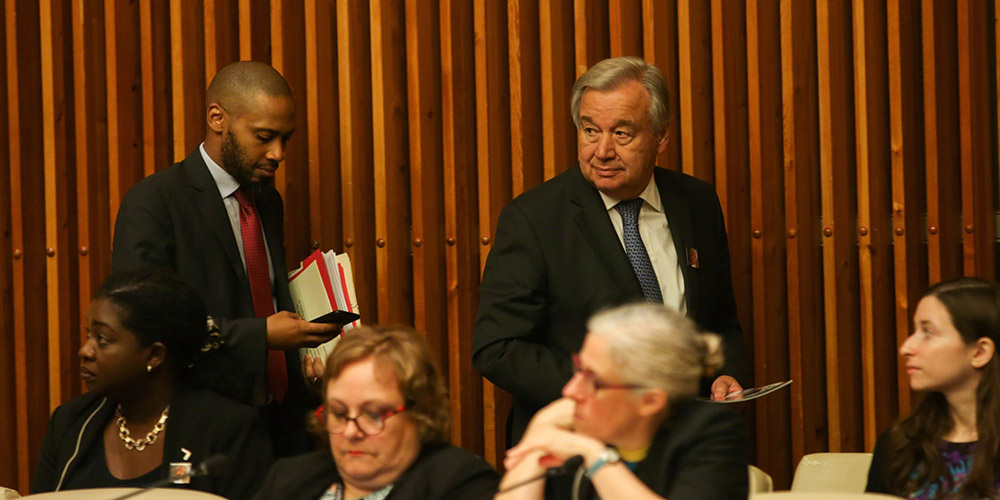
UN Secretary-General António Guterres around the venue.
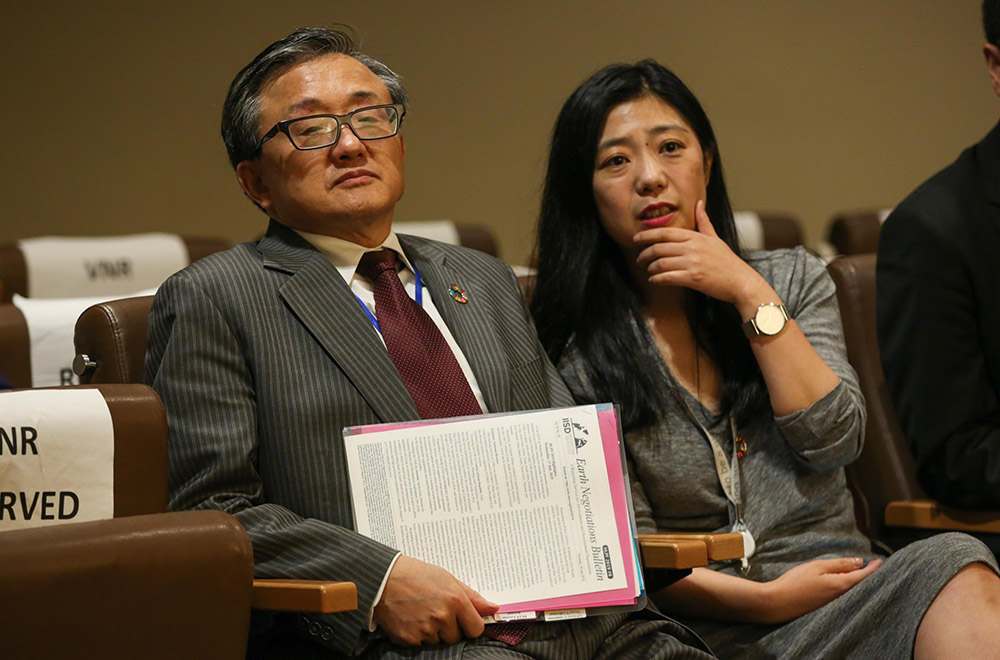
Liu Zhenmin, UN Under-Secretary-General, Economic and Social Affairs, holding a copy of the Earth Negotiations Bulletin.
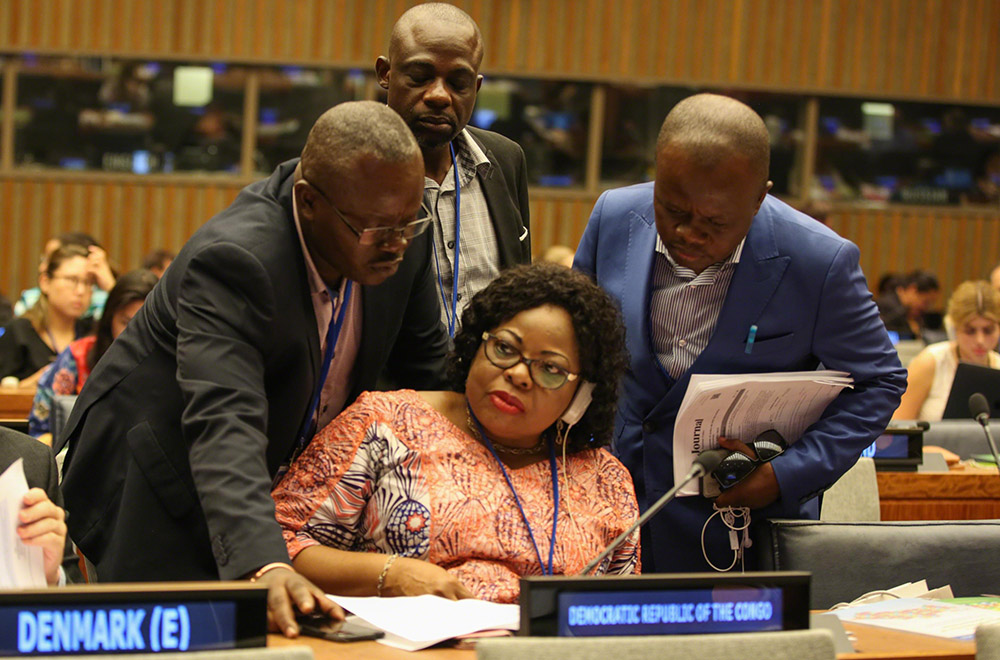
Delegates from the Democratic Republic of the Congo
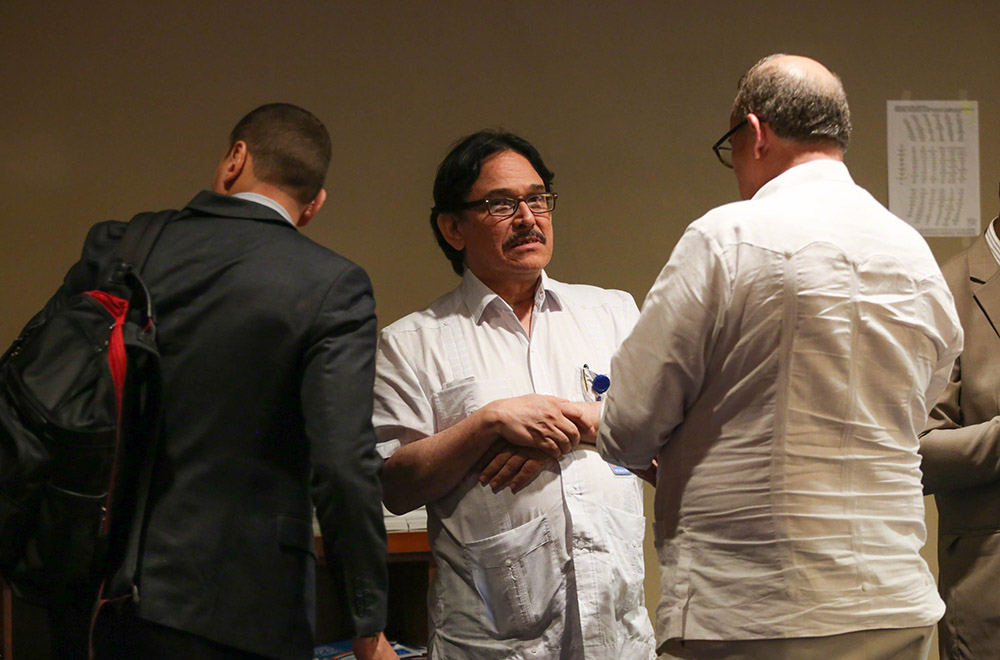
Jaime Hermida, Nicaragua, speaks with delegates
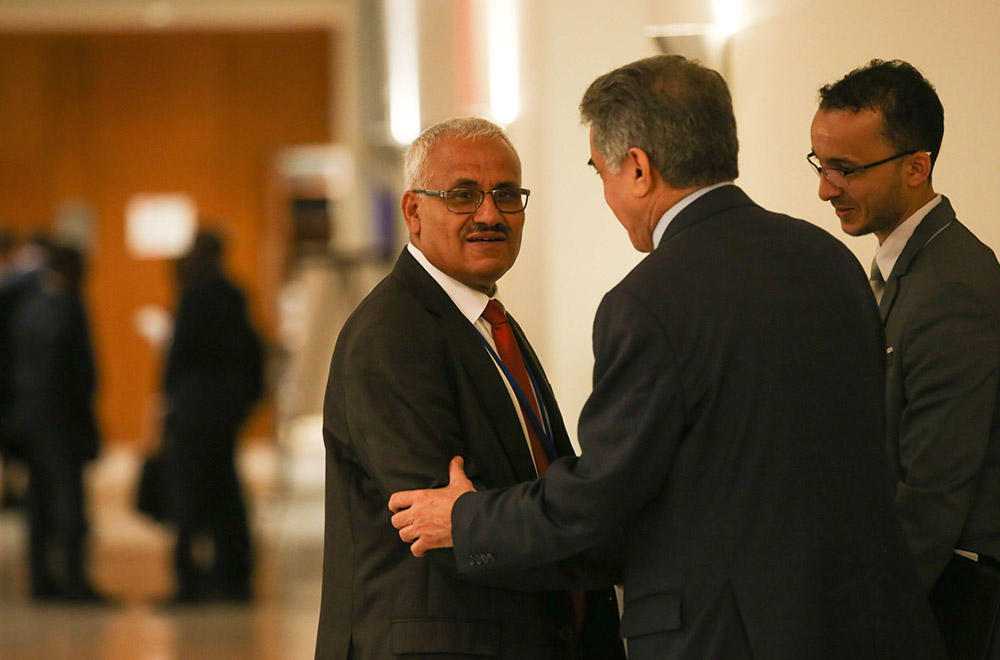
Belgacem Ayed, Ministry of Development, Investment, and International Cooperation, Tunisia
Delegates between sessions.
Visitors to the UN pose in front of the Nelson Mandela statue in celebration of International Nelson Mandela Day.
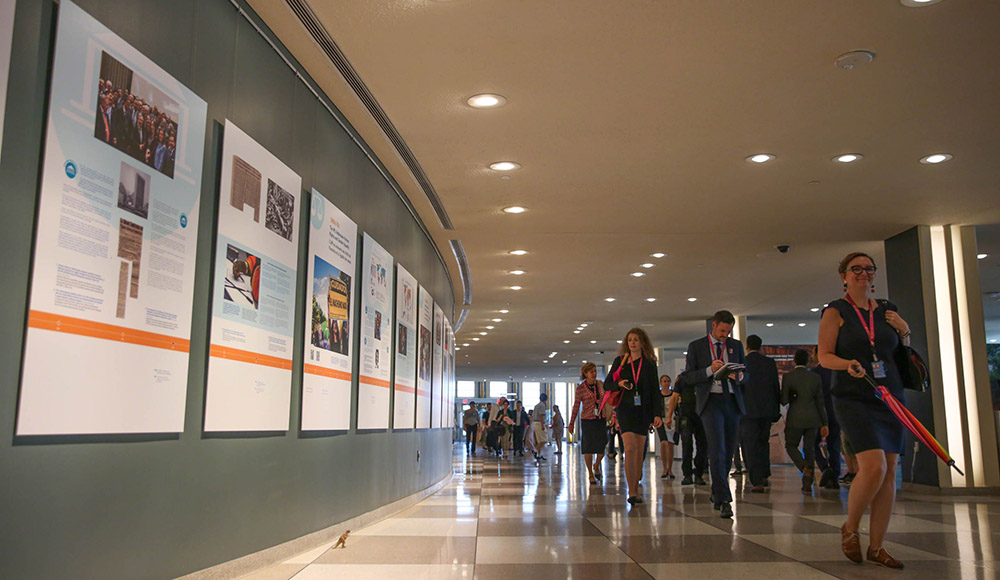
Around UN Headquarters.

 Ten countries presented their voluntary national reviews (VNRs) on Thursday: Cameroon, Tunisia, Congo, Nauru, Guyana, Mauritius, Oman, Liechtenstein, Mauritania, and Turkmenistan.The General Debate continued in parallel in the afternoon, with 37 Heads of State and Government, ministers, and ambassadors making statements, which can be accessed here.A session on lessons learned from the first cycle of HLPF in the evening started with an “intergenerational dialogue” between David Donoghue, co-facilitator of the intergovernmental negotiations on the 2030 Agenda, and Jayathma Wickramanayake, UN Secretary-General’s Envoy on Youth. Wickramanayake called for the empowerment of youth, and fulfillment of the SDGs to ensure young people, constituting half the world’s population, have security, jobs, and opportunities to fulfil their potential. Donoghue said the intention to put “the infinite capacity of young people for activism” at the heart of the 2030 Agenda had not yet been realized, and worried that young people feel “betrayed” by their political institutions.UN Under-Secretary-General Liu Zhenmin listed the achievements of the HLPF so far, including: presentation of 142 VNRs; review of all of the SDGs; organization of regional fora; and stakeholder contributions. Presenting the preliminary and partial results of a survey conducted to inform the upcoming HLPF review process, Zhenmin said respondents believed the HLPF has fulfilled its functions; and the VNRs were useful to share lessons and challenges, advance implementation, and mobilize partners.In a discussion on lessons learned from the first cycle of the HLPF, speakers called for more inclusivity, more time and space for interaction, better use of regional institutions and spaces, a Ministerial Declaration that reflects the outcomes of a session, and better follow-up after a session, among many others.While discussing key messages for the SDG Summit, speakers highlighted the strong country ownership of the SDGs evidenced by national polices and actions; local-level reflection; and budgetary allocations for the SDGs. The challenges listed included difficulties in long-term planning, awareness building, and resource mobilization. Proposed focus areas included: a better understanding of interlinkages; the role of science, technology, and innovation in enabling co-benefits; governance, for integration and coordination; accurate and timely data for informed decision-making; gender equality and empowerment of women and girls; partnerships, including international cooperation; and regional forums that enable a space for peer learning and showcasing practical solutions.In the closing session, ECOSOC President King introduced the draft procedural report of the 2019 HLPF (E/HLPF/2019/L.1), which was adopted without amendments. Deputy Secretary-General Amina J. Mohammed highlighted three main areas: “the inclusion imperative”; democratic and effective institutions; and political commitment.The meeting was gaveled to a close at 6:04 pm.For more details on the day’s events and to hear what delegates said in the corridors, see our daily Earth Negotiations Bulletin (ENB).
Ten countries presented their voluntary national reviews (VNRs) on Thursday: Cameroon, Tunisia, Congo, Nauru, Guyana, Mauritius, Oman, Liechtenstein, Mauritania, and Turkmenistan.The General Debate continued in parallel in the afternoon, with 37 Heads of State and Government, ministers, and ambassadors making statements, which can be accessed here.A session on lessons learned from the first cycle of HLPF in the evening started with an “intergenerational dialogue” between David Donoghue, co-facilitator of the intergovernmental negotiations on the 2030 Agenda, and Jayathma Wickramanayake, UN Secretary-General’s Envoy on Youth. Wickramanayake called for the empowerment of youth, and fulfillment of the SDGs to ensure young people, constituting half the world’s population, have security, jobs, and opportunities to fulfil their potential. Donoghue said the intention to put “the infinite capacity of young people for activism” at the heart of the 2030 Agenda had not yet been realized, and worried that young people feel “betrayed” by their political institutions.UN Under-Secretary-General Liu Zhenmin listed the achievements of the HLPF so far, including: presentation of 142 VNRs; review of all of the SDGs; organization of regional fora; and stakeholder contributions. Presenting the preliminary and partial results of a survey conducted to inform the upcoming HLPF review process, Zhenmin said respondents believed the HLPF has fulfilled its functions; and the VNRs were useful to share lessons and challenges, advance implementation, and mobilize partners.In a discussion on lessons learned from the first cycle of the HLPF, speakers called for more inclusivity, more time and space for interaction, better use of regional institutions and spaces, a Ministerial Declaration that reflects the outcomes of a session, and better follow-up after a session, among many others.While discussing key messages for the SDG Summit, speakers highlighted the strong country ownership of the SDGs evidenced by national polices and actions; local-level reflection; and budgetary allocations for the SDGs. The challenges listed included difficulties in long-term planning, awareness building, and resource mobilization. Proposed focus areas included: a better understanding of interlinkages; the role of science, technology, and innovation in enabling co-benefits; governance, for integration and coordination; accurate and timely data for informed decision-making; gender equality and empowerment of women and girls; partnerships, including international cooperation; and regional forums that enable a space for peer learning and showcasing practical solutions.In the closing session, ECOSOC President King introduced the draft procedural report of the 2019 HLPF (E/HLPF/2019/L.1), which was adopted without amendments. Deputy Secretary-General Amina J. Mohammed highlighted three main areas: “the inclusion imperative”; democratic and effective institutions; and political commitment.The meeting was gaveled to a close at 6:04 pm.For more details on the day’s events and to hear what delegates said in the corridors, see our daily Earth Negotiations Bulletin (ENB).












